

THE UBYSSEY
EDITORIAL
Editor-in-Chief
Aisha Chaudhry eic@ubyssey.ca
Managing Editor Saumya Kamra managing@ubyssey.ca
News Editor Stephen Kosar news@ubyssey.ca
Arts & Culture Editor
Julian Coyle Forst culture@ubyssey.ca
Features Editor Elena Massing features@ubyssey.ca
Deputy Managing & Opinion
Editor Spencer Izen deputymanaging@ubyssey.ca opinion@ubyssey.ca
Humour Editor Kyla Flynn humour@ubyssey.ca
Sports & Recreation Editor Caleb Peterson sports@ubyssey.ca
Research Editor Elita Menezes research@ubyssey.ca
Illustration & Print Editor Ayla Cilliers illustration@ubyssey.ca
Photo Editor Sidney Shaw photo@ubyssey.ca
Digital Editor Sam Low samuellow@ubyssey.ca
Business Manager Scott Atkinson business@ubyssey.ca
Account Manager Ben Keon advertising@ubyssey.ca
President Ferdinand Rother president@ubyssey.ca
Editorial Office: NEST 2208 604.283.2023
Business Office: NEST 2209 604.283.2024
6133 University Blvd. Vancouver, BC V6T 1Z1
Website: ubyssey.ca Bluesky: @ubyssey.ca Instagram: @ubyssey.ca TikTok: @theubyssey LinkedIn: @ubyssey
LAND ACKNOWLEDGEMENT
The Ubyssey acknowledges we operate on the traditional, ancestral and stolen territories of the Coast Salish peoples including the xʷməθkʷəy̓əm (Musqueam), Sḵwx̱wú7mesh Úxwumixw (Squamish) and səlilwətaɬ (Tsleil-Waututh) nations.
LEGAL
student organization and all students are encouraged to participate.
Editorials are written by The Ubyssey’s editorial board and they do not necessarily reflect the views of the UPS or UBC. All editorial content appearing in The Ubyssey is the property of the UPS. Stories, opinions, photographs and artwork contained herein cannot be reproduced without the expressed, written permission of the Ubyssey Publications Society. The Ubyssey is a founding member of Canadian University Press (CUP) and adheres to CUP’s guiding principles. The Ubyssey accepts opinion articles on any topic related to UBC and/or topics relevant to students attending UBC. Submissions must be written by UBC students, professors, alumni or those in a suitable position (as determined by the opinion editor) to speak on UBC-related matters. Submissions must not contain racism,
sexism, homophobia, transphobia, harassment or discrimination. Authors and/or submissions will not be precluded from publication based solely on association with particular ideologies or subject matter that some may find objectionable. Approval for publication is, however, dependent on the quality of the argument and The Ubyssey editorial board’s judgment of appropriate content. Submissions may be sent by email to opinion@ ubyssey.ca. Please include your student number or other proof of identification. Anonymous submissions will be accepted on extremely rare occasions. Requests for anonymity will be granted upon agreement from seven-eighths of the editorial board. Full opinions policy may be found at ubyssey.ca/pages/submit-an-opinion It is agreed by all persons placing display or classified advertising that if the UPS fails to publish an advertisement or if an error in the ad occurs the liability of the UPS will not be greater than the price paid for the ad. The UPS shall not be responsible for slight changes or typographical errors that do not lessen the value or the impact of the ads.
The Ubyssey periodically receives grants from the Government of Canada to fund web development and summer editorial positions.

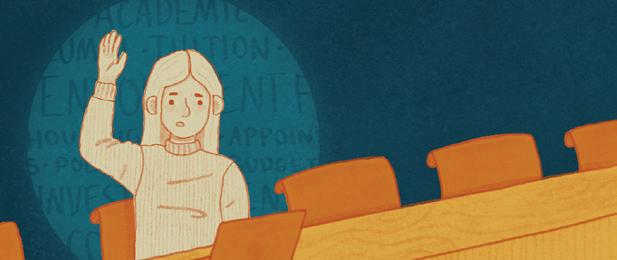
OUR CAMPUS
Post-Plumtree, Carla Gillis keeps making her way back to music

Carla Gillis and her sister Lynette have always been in a band. In high school, it was Plumtree: a youthful collision of the Gillis sisters’ metal influence and their classmates’ pop sensibilities. On their second album, Predicts the Future, Plumtree released an infectiously-catchy, if lyrically-minimalist, song by the name “Scott Pilgrim.” You might have heard this story: Plumtree split up after their third album in the year 2000, and four years later, that song became the title of friend and fan Bryan Lee O’Malley’s hugely popular graphic novel series and, eventually, film. But Carla and Lynette did not stop being in bands.
The Gillis sisters had moved from Halifax to Vancouver around the time O’Malley started working on Scott Pilgrim. Having been a musician since middle school, Carla enrolled in UBC’s master’s in creative writing to further develop her skills.
“This batch of songs I got to write in the program were really just me, writing all by myself,” Carla said. “Plumtree often co-wrote songs. So it was a great chance to find my voice, to experiment.”
The shift in artistic environment to a classroom setting forced Carla to write in directions she’d never considered before. She started asking herself questions, probing into what it was she really loved to write about and what throughlines she could find in her art. The answer was, decidedly, family.
“I remember my parents sold our childhood house while Lynette and I had moved to Vancouver. We had lived there for … 20-some years, and the band Plumtree always practiced there.”
The loss of this space brought Carla into writing more intentionally about family. “It was always in my dreams.” The support of her parents and the collaboration with her sister always anchored her music in Halifax and in that family home; when it was gone, she noticed just how much family came up in her writing. She started to write about Cape Breton,
where her parents were from. “They are Cape Bretoners who loved fiddles and square dancing. My sisters and I grew up in Halifax, and weren’t interested at all in that, but then you move away from home.”
Carla grew up in a busy, vibrant home. There were the four Gillis children who lived there, along with the other kids their mother babysat. Friends came over a lot. They had band practice in the basement, pets running around. “It was quite a chaotic environment,” Carla recalls. They were a big family in a tight space, which often makes for a tight family. In 2008, Carla and Lynette lost their older sister, Darlene, in a car crash. “How do you process that? How do you kind of make sense of it, or come through it?”
For Carla and Lynette, they found their answer in each other and in their music. In 2015, under the name Overnight, the Gillis sisters released Carry Me Home. It is a much heavier album than anything they had produced, almost unrecognizable next to the youthful trilogy of Plumtree records. Having grown up with metal, Carla and Lynette embraced this new sound, and in creating this album, worked through their grief — together. “It can take so long, but I think writing a lot of those songs helped us do something with those feelings. And I think that’s what music is for us, in a big way.”
Between Carry Me Home and Overnight’s newest release, Put Me In Your Light, Carla and Lynette had strikingly identical changes in career. “Lynette and I went to therapy school, and I was doing a ton of personal therapy in those 10 years, and still am,” Carla said, “and I think that that’s been really helpful for making sense of things.” After her master’s, Carla moved to Toronto and became the music editor for the Toronto Alt-Weekly newspaper. Unfortunately the print media industry was declining quickly at the time, and what started as a fruitful career opportunity became rather unstable. “Everyone was doing the job of 10 people.” Eventually, the Gillis sisters needed a change, and as fate would have it, they would again be pursuing the same dream. Carla’s creative
background lent a lot to her new clinical work. “A lot of my clients are musicians and artists,” Carla said. “All of that life experience has ended up being very useful in this career as well.”
The same was true in reverse: becoming therapists helped Carla and Lynette process music in new ways. Put Me In Your Light, like the album before it, is built out of the loss of a family member: Carla and Lynette’s father, who passed away in 2020. Added to that grief was their move back to Halifax, away from Toronto and their pre-pandemic community. Despite all this turbulence, however, the tone of this new album is exceptionally optimistic and bright. It dives into some dark points on tracks like “The World to See” and “Wind + Trees,” but it is also full of lively songs braiding together joy and sorrow, as in “Pothos” and “Strong + Good.” Carla said that her and Lynette’s education and experience in the world of clinical therapy has been foundational in this more optimistic approach.
Carla and Lynette have always been in a band. There was, as there often is for young musicians, a drive to “make it” as artists. Plumtree has seen a good deal of posthumous popularity thanks to the Scott Pilgrim books, film and animated series. “I don’t think we thought of that as, ‘Oh, we’ve made it,’” she said. “I think because it looked extremely different than what we thought making it would look like, which was more like being a full-time musician, which we weren’t.” Despite this, the sisters stayed together and continued to make music. Family is at the heart of Overnight and has been a persistent theme in Carla’s writing since her days at UBC. Her family has changed over the years and her career has bounced between entirely disparate industries, but she is still in a band with her sister.
“You know, you get older, you sort of fade to the background, you become more and more invisible. And we’re like, well, let’s push against that. Let’s keep putting our voice out there. We have no idea if people will be interested but it feels very important to us to keep doing it.” U
AYLA CILLIERS
COURTESY CARLA GILLIS
Family has been a persistent theme in Carla’s writing since her time at UBC.
Ewan Keenan Contributor
Effects of international study permit reduction remain unclear for UBC
Sophia Samilski News Reporter
How the federal government’s plan to sharply reduce new international study permits will affect UBC’s budget remains uncertain, according to the university. The federal budget, released on Nov. 4, outlines a 49 per cent cut to new permits in 2026 from this year’s target, lowering the total to 155,000.
The federal government’s plan reduces the number of new international permits from the 2025 target of 305,900 to 155,000 in 2026 and 150,000 per year in 2027 and 2028.
In a statement to The Ubyssey, UBC Media Relations Director of University Affairs Matthew Ramsey wrote, “How those [new] levels translate to institutional targets and attestation letter allocation remains unclear. It is too early to speculate on the impact of the new measures as we await additional information from the government in the days and weeks ahead.”
According to UBC’s 2025-26 budget, 22 per cent of the university’s operating revenue will come from international tuition this year, for a total of $606 million, compared to $626 million in 2023-2024, marking a three per cent decrease since international student caps came into place.
The reductions come after a series of measures that have been announced over the years to achieve a goal of reducing the share of temporary residents to five per cent by the end of 2026 and less than five per cent by the end of 2027. This number is intended to ease the rental market, labour market and public services facing high demand.
“Managed immigration growth is now helping to stabilise labour-market conditions and is expected to support better outcomes for youth,” the federal budget reads.
According to Ramsey, there are no university-wide plans to implement systemic cuts at this time, but previous caps leading to decreases in international students are already impacting some parts of the university. This has included reduced operating budgets and led to staff reductions in some units. Ramsey stated that UBC has utilized many measures to mitigate impacts.
“UBC has been curbing discretionary spending, implementing hiring pauses, and developing a new voluntary retirement program as a tool to support our financial position, workforce planning, and to provide voluntary options for employees,” he wrote.
In a statement to The Ubyssey, AMS VP External Solomon Yi-Kieran wrote that UBC will likely weather this crisis better than other institutions, but warned that the impact of the changes could still be severe and the cut “will have massive impacts on the entire post-secondary education system in this country and this province.”
“Other universities have had to cut programs, such as [Vancouver


Island University] cutting 10 programs this fall, something which could become a reality at larger institutions as well,” they wrote.
“However, the scale of this change could see dire cuts to programs, staffing, support services, food-security, and every other part of the UBC experience.”
UBC’s total international student count fell by 4.7 per cent between the 2023-24 and 202425 academic years, falling from 19,600 to nearly 18,700 students.
Kevin Milligan, director of the
Vancouver School of Economics, told The Ubyssey the university is also seeing a drop in the number of applications from international students.
“Many attribute this to all the negative headlines in student source countries about coming to Canada. I think there is something to that,” he said. “I wish the federal government would take more care in its messaging — I worry they are discouraging great students from applying.”
The university’s 2025-26
budget forecasts total tuition revenue of $1.035 billion — $13 million lower than the forecast for 2024-25 — primarily due to decreased international enrolment. Although yearly tuition increases will offset some losses, UBC still expects a 5.1 per cent decline in international undergraduate tuition revenue.
In an effort to prevent the university from compensating for reduced international tuition revenue through steeper tuition hikes, Yi-Kieran said that the
AMS will be pushing the provincial government for an international student tuition cap and also pushing to protect and maintain the current 2 per cent domestic student tuition cap under the province’s tuition limit policy.
“We will be calling for the province to reaffirm its commitment to maintaining the tuition limit policy and reject any proposal to lift the 2 per cent cap on domestic tuition and mandatory fees. This will need to be a yearafter-year advocacy ask.” U
COURTESY ADRIAN WYLD / THE CANADIAN PRESS
The federal budget halved the number of new international study permits for 2026.
JASMINE FOONG / THE UBYSSEY
AMS VP External Solomon Yi-Kieran wrote that the permit reduction will have massive effects across the country, even if UBC will likely weather the cuts better than smaller universities.
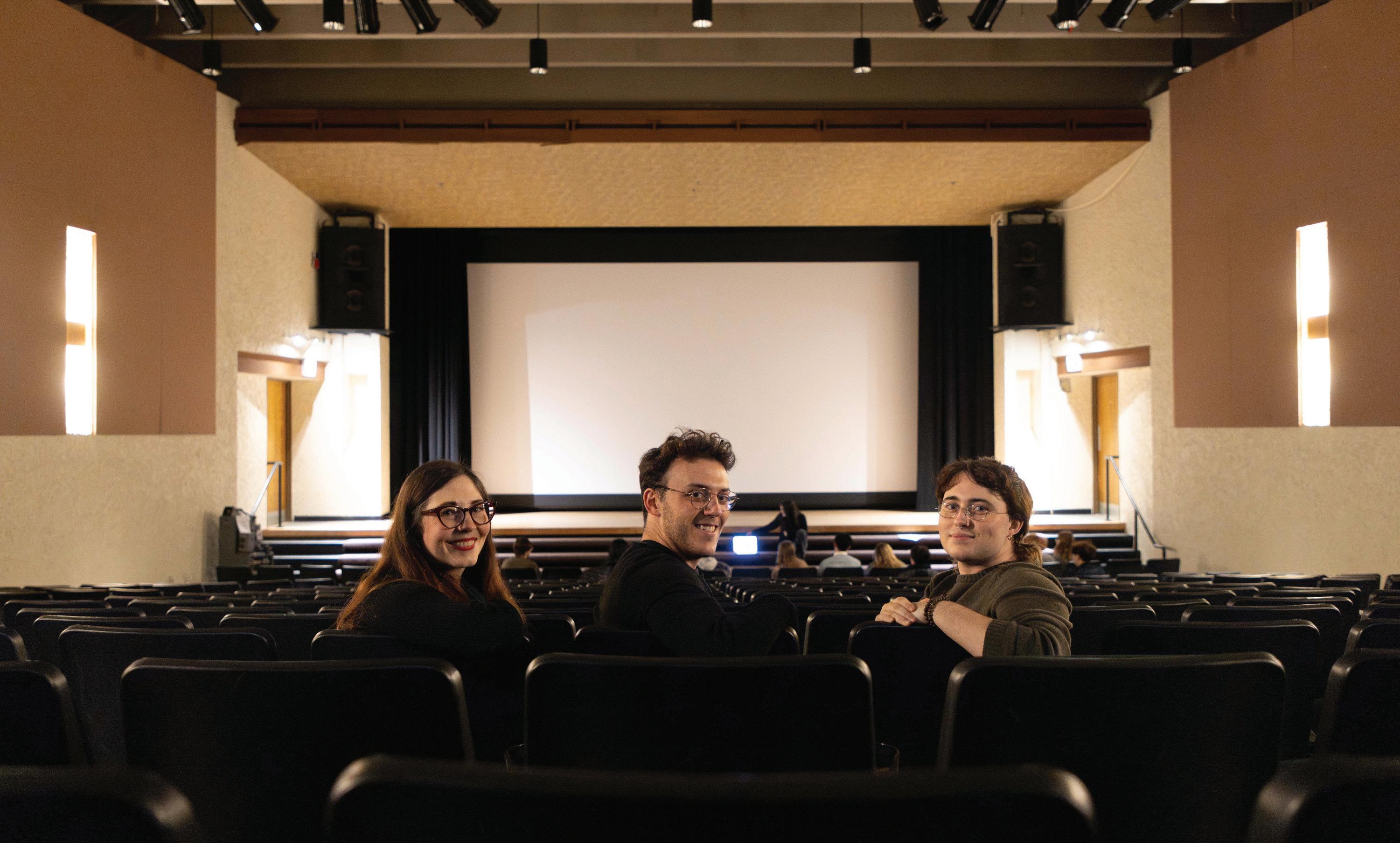
The UBC Film Society goes global with international horror festival
Jenni Nguyen Contributor
Cheap thrills and artsy kills — this is the best way to describe Italian slasher films, and Dario Argento’s eighth slasher is no exception. Averaging a murder every 10 minutes, boasting gory madness to a ‘70s synth score, Tenebre is now renowned as a cult classic in the giallo genre, in spite of its lukewarm reception in Italy upon release and its complete flop in the U.S. two years later. The film stars Anthony Franciosa as Peter Neal, an American writer visiting Italy who gets pulled into a murder mystery when a series of killings mimicking his novels occurs. It was screened for the conclusion of the Global Horror Film Festival, organized in collaboration with the UBC Film Society and the Arts Languages Max Working Group as part of Arts Multilingual Week at UBC.
The Film Society, established in 1936, is one of the oldest organizations at UBC. Everett Goodyear, a first-year MA student in the cinema and media studies program and co-programming coordinator for the society said their long-standing mission is to “get butts in seats,” especially in the post-COVID era, where the number of people going out and seeing films has plummeted due to the rising popularity of streaming services and issues
of affordability. As opposed to an $18 movie ticket, UBC Film Society charges $5 for a yearlong membership which grants students access to all of the club’s screenings.
“We want people to come and see things, we want them to trust [our film selection],” said Goodyear. “The goal with this festival was to take our audience base and push them towards something just slightly outside of their comfort zone.”
The Global Horror Film Festival ran from Oct. 27-30 and was free to attend at The Normand Bouchard Memorial Theatre. It featured a variety of films sponsored by student clubs. From East Asian horror anthology Three… Extremes, promoted by UBC K-Wave, to Swedish vampire film Let the Right One In introduced by the Scandinavian Students Association, to stop-motion animation horrorscape Lunacy, as part of the “Surreal Slavic Specters” showcase of the festival, there was something for everyone, horror fans and curious film enthusiasts alike.
Dr. Elizabeth “Biz” Nijdam, an Assistant Professor of Teaching in the department of central, eastern, & northern European studies (CENES) was involved with organizing the festival in her capacity as co-lead of the Languages Max working group.
At times, university language programs can feel in competition
with each other, she said, “but at UBC, we decided as language instructors that [we] wanted to work together instead of apart.”
Dr. David Gramling, a faculty member in CENES, established Languages Max in 2020, bringing together over 20 faculty members to draw attention to and celebrate the value of instructed language learning on campus, the role of multilingualism and language diversity in students’ lives.
“The idea came to us that we could support programming around multilingualism through horror films, and have a global perspective, partnering with various units and clubs on campus,” said Biz.
Arts Multilingual Week was one of the working group’s first initiatives. The annual event sees the collective organizing student-facing programming that allows students to exercise creative expression through multilingual modalities. “We’re in our fourth year and we have some key events, including the Multilingual Poetry Slam, an open mic night, and now, for our second year, the Global Horror Film Festival, [which has] become part of our programming,” Biz said.
“Of course, there’s multilingual programming across campus all year round, but we wanted to carve out one week where we really showed the university community how important multilingualism is to our students and
how it’s so fundamental to their identity. We exist in this monolingual institution where French should be our second language, and h ə n q ̓ə min ̓ə m is actually the first language of UBC Vancouver, and yet we speak almost exclusively English,” Biz said.
This commitment to celebrating multilingualism is a natural bridge to screening foreign language horror films for the Halloween season. While there is vast variety in English-language classics, from supernatural horror like The Exorcist or Pet Sematary to more experimental films that influenced the genre like The Blair Witch Project and, of course, the classic Rocky Horror Picture Show , there are multitudes of horror films, and films in general, to be discovered that showcase familiar themes with cultural twists from other parts of the world.
“I think often you are made to be slightly insecure if you’re going to go see foreign language films. It’s ‘film bro-y,’ it’s a little pretentious,” said Goodyear.
“I wanted to expand people’s perception of what non-English language movies can be like. They can be fun, and they can be cultish, and you can come and just have a good time.”
“That’s a barrier for quite a lot of people. Maybe they don’t want to watch a serious movie, but actually, there’s lots of fun, funky horror. [We are] trying
to get people to recognize that the things they like in familiar movies, there are also bits of that cross-culturally as well.”
Tenebre is an excellent encapsulation of this sentiment. Fun, funky, campy and featuring many beautiful women getting murdered, it presents a familiar Western slasher plot with Italian influences. The cinematography is impressive — for example, many of the indoor scenes are filmed on plain sets and the actors wear pale clothing to accentuate the gallons of bright red, sticky, fake blood they use in the murder scenes. The film has artifacts of the ‘whodunit’-style plot as a thinly-veiled excuse for the kind of excessive killing you would find in more well-known classic slashers like Scream or Halloween , while introducing the stunning camerawork that familiar viewers expect from giallo.
It was clear to me that I was not alone in the pure joy and incredulity watching Tenebre
The rest of the audience was also invested, laughing at the sillier, more stereotypical slasher scenes; launching gasps of disbelief and staggered, uncomfortable laughter at the tension-built, horrifying deaths in spite of its campy nature and framing. When the screen faded to black, the audience, myself included, burst into laughter and clapped like we were watching an international comedy debut at Cannes. U
(Left to right) Everett Goodyear, Isaac Tetreault and Elizabeth “Biz” Nijdam, organizers of the international horror festival, in the Norm Theatre.
SIDNEY SHA /THE UBYSSEY
DOCUMENTARY SCREENING //
Julietta Singh rebuilds her knowledge of home in new documentary, The Nest
Morgan Stouck Contributor
A stately 19th-century house stands in remarkable condition on what was once the Red River Settlement. The Victorian-style home is surrounded by mature trees and lush greenery. A woman in an elaborate red dress walks through the home, whose décor carries the exterior’s stately appearance. As she walks up the spiraling staircase, the camera pans to her feet and we see that she is wearing moccasins. As she nears a balcony, the music builds. She walks toward the railing — and then the image flashes to another woman standing in the same place, looking over the same railing.
This second woman from the opening scene of The Nest is director and writer Julietta Singh. The Nest is a new documentary that follows Singh as she says farewell to her childhood home. It was screened on Nov. 5 at the Chan Centre. Singh originally conceived of the project during the COVID-19 quarantine in 2020, shortly after her mother suffered a major head injury at home that left her partially paralyzed.
She explained in a Q&A following the screening that “it was really difficult to not be able to go home and see her, and she was facing the end of her life at home, which — in the mind of her family at large — is kind of the end of her life, period. Because she spent 45 years in that house, and so to remove her from that place signaled a kind of profound end for all of us.”
Hoping to find a history of the place her mother cared for so deeply, Singh began searching in the local archives. Her goal was to offer her mother “a set of legacies of the home that she didn’t know.” She hoped this would help her mother “understand herself as part of this extraordinary legacy.”
It was in the margins of these archives that the legacies came to life. The Nest reveals these histories through the stories of the women

who came to live in the house prior to Singh’s mother — the first one the documentary chronicles is Anne Bannatyne.
Bannatyne was a Métis woman who lived in Singh’s mother’s home during the 19th century. She is most famous for publicly horse-whipping Charles Mair, a settler who had written a racist, anti-Métis letter published in The Globe (now called The Globe and Mail).
“In discovering [Bannatyne], I was discovering nothing short of another world,” said Singh in The Nest. It was Bannatyne who inspired the film’s title — she referred to the home as ‘The Nest,’ “a name [Singh] never learned growing up, that was concealed by a colonial history.”
The film’s revelations invite reflection on what it means to be-
long within a colonial state. What The Nest reveals to us is that often the making of home is related to resistance.
After discovering Bannatyne, Singh continued into the margins and the house revealed another woman of resistance — Mary Ettie McDermid. McDermid lived in The Nest toward the turn of the 20th century. She was Manitoba’s first deaf teacher and spent her career teaching deaf children how to access language and communication through ASL.
After the Milan Conference of 1880, which removed ASL from schools and deemed oral teachings superior, McDermid began teaching children sign language in her home. Throughout the film, the house’s history creates clear intersections of resistance between
generations of women. An anti-colonial legacy begins to take shape and resistance signals its presence within colonial histories.
The Milan Conference coincided with the first major wave of Japanese migration to Canada, which was followed by a long, deep history of racism that subjected Japanese Canadians to state violence.
Singh explained that “the only bit of history I knew growing up was that just before we lived here, the house served as the Japanese consulate.” Searching through the archives, she discovered the Okazaki family, who moved into The Nest to serve as ambassadors.
“I began to dream of their life here,” she said. “Never once did it occur to me that other racialized girls and women had been here

before us. The neighbourhood was too white and alienating to imagine we were not its first outsiders.”
Through the practice of critical fabulation — a process coined by cultural scholar Saidiya Hartman in which researchers and storytellers examine what information is missing from an archive in order to better understand omitted or repressed stories — Singh takes what is absent from colonial archives and expands it to include the identities that call into question our history. This reflects what is described at the beginning of the film as “fully [embodying] the erasures of colonial history.”
The film returns to the question of legacy in its final moments. The director and her mother sit in the home and discuss what the project has brought to their relationship.
“By reaching for my mother at the end of her life, what I found was not a hidden version of her I longed for, but a history of women whose legacies had always been here … those who lived here in resistance to the oppression of their people.”
This is a remarkable film — I highly encourage anyone interested to watch it. It indicates what Singh highlights as a rather mundane facet of colonial legacies.
“What I really hope that everybody comes away thinking about when they see this film is not that there’s one exceptional house that I grew up in, but that settler colonial architecture is absolutely filled with extraordinary histories that we haven’t been taught to think about or feel a way toward.”
The Nest will be available for screening through the National Film Board’s website in 2026. In the meantime, readers can turn to Singh’s other works, including her books No Archive Will Restore You and The Breaks, which also explore questions of inheritance, embodiment and belonging.
Hoping to find a history of the place her mother cared for so deeply, Singh began searching in the archives.
MAVELYN BUGH / THE UBYSSEY
Study finds Disco is back, UBC anticipates Boogie Fever outbreak
Mason Carter Contributor
In Winter Session 2025-26 Term 2, UBC will be adding an extra five minutes to the standard 10-minute break between classes to account for slower walking speeds, due to a substantial increase in the amount of boogie-ing occurring on campus. This change comes at the recommendation of UBC Student Health Services, after their 2025 study found that Disco is indeed back.
The study, which was published in Dancer Insider on Oct. 10, in collaboration with researchers from both the UBC Faculty of Medicine and the federal government, found there has been a 569 per cent overall increase in factors contributing to Boogie Fever cases. In a statement on their website, UBC Student Health Services stated that this points towards a full-on Disco outbreak on the horizon.
“Boogie Fever is traditionally mildly contagious, but if not frequently acted upon, it could lead to increased contagiousness. Side effects include more flashmobs, chest hair and sequins. Nothing to be afraid of unless you hate feeling groovy,” said Dr. Mike L. Jackson, the primary investigator within the study and senior professor of discotheques in the early ‘70s, in an interview with The Ubyssey.
In the study, researchers observed a variety of students under various conditions. Experiments

“Side effects
include more flashmobs, chest hair and sequins.”
included simulations, survey responses and A/B testing. After several months of testing, they discovered there has been a 37 per cent increase in the wearing of bell bottom jeans, the percentage of students with afros rose to 20 per cent and the Bee Gees’ Children of the World (1976) was streamed at record-breaking rates across both Apple Music and Spotify. All factors point to UBC facing a fullblown Boogie epidemic.
For several years, there has been speculation that Disco is
IT’S A BIRD, IT’S A PLANE, IT’S A PISSER //
creeping back into the mainstream, but Big Pop, Big Rap and Big Country have banded together to dismiss these claims over the years. Dom Inatethecharts, CEO of Spotify, released a formal statement on the matter in 2021, telling music enjoyers that “Disco was your mom’s pop. Why listen to ABBA when you have Gracie Abrams? Barry Manilow? More like those songs are kinda slow.”
Contrary to Inatethecharts and others’ efforts, the study proves that, despite what Big Music is try-
ing to make you think, Disco is indeed back (and stronger than ever) with new emerging subgenres such as Disco-rap, Disco-house and even Disco-bedroom-pop-folk-alternative. Local organizations have taken note and have launched new initiatives to cater to this emerging generation of groovers.
“If the students want Disco, then that’s what we’ll give them,” comments George Michale, owner of The Pit, who decided to convert his weekly programmed Pit Nights to Disco Days, requiring mandato -
ry sequined attire for entry. When asked if worried this new initiative would affect business, Michale commented, “Have you seen the new study? Disco is back, science doesn’t lie. Think about it! People love history. At first, everyone wanted their events to be Y2K themed, then it was the ‘90s, no one remembers the ‘80s so we had to skip that, but what better way to represent the ‘70s than with Disco balls, musky cologne, deep cut V necks and free shrooms. Just wait until 2027 — I envision The Pit will be hosting a weekly Polka Night.” The researchers of the study are excited about the innovations which seem to be stemming from their findings; they hope that their research will spark additional studies of, funding for and conversation around the topic, with an overarching goal of finding out why Disco disappeared in the first place.
“Do you remember the 21st night of September last year? I do, and there wasn’t a feeling of comorbidity. There were no fingers pointed in the air, no arms cranked into a sprinkler, no YMCA. It was a darker and bleaker time,” said Jackson.
Pissed on, pissed off: Who is the UBC pisser?
Nilsa Nilli Contributor
Whether your doomscroll app of choice is TikTok, Instagram or Tumblr (if you’re old-fashioned), you’ve probably come across the infamous university pissers. It’s gotten so popular that there are now multiple accounts dedicated to catching these pissers. Today, I will put on my detective cap and determine who the pisser truly is. Is it my current situationship who has yet to respond to my text (how busy could someone in forestry truly be)? Is it the CEO of Workday pissing on our campus because pissing on our schedules, registration system and overall peace of mind just wasn’t enough? Or is it the TA who for some reason had a personal vendetta against me in second-year? Stay tuned to find out just who I decide to defame the pisser truly is.
Here are the facts. Fact one: the first piss the pisser posted was at the UBC Engineering Cairn. This immediately eliminates all the engineering students as potential suspects, since they all took a blood oath in first-year Jump Start where they swore their allegiance to the E. This is rather unfortunate for me because I have a lot of people I want to defame in engineering genuine interest in finding out who the pisser is (obviously, why else would I write a piece about the pisser like a month after the pisser was pissing).

Apparently “innocent until proven guilty” is how justice works? Idk.
The next place the pisser targeted was Walter Gage residence: home of bed bugs, stained curtains and persistent dread. Also, students. Walter Gage is also really close to the Arts Student Centre, colloquially known as “the garbage can building.” UBC built it for their largest faculty so they have a place to put the trash. It is statistically likely that the pisser is an arts stu-
dent — not for any actual statistical reasons, but because someone always has to take the piss out of something and it’s almost always an arts student. However, this doesn’t fit my personal narrative, so we’re going to move on.
Across the way from where all the arts kids reside is the Sauder School of Business, or as I like to call it, Dr. McEvil’s School of
Super-Villainy. I definitely wouldn’t put it past a Lex Luthor wannabe to piss all over campus, but I have been instructed by my higher-ups that I will in fact be sued if I continue to be “unethically mean and lowkey kind of evil,” so I have to say they are innocent for now. Apparently “innocent until proven guilty” is how justice works? Idk. So far, we have eliminated
“Disco might be back, but we don’t know for how long, and why. We must continue diving deeper into the Boogie Fever, we must infect the world until there’s no one left unaffected, because everyone deserves to dance to Disco.” U engineering, arts and Sauder — so what’s next? Well, we have to look at the pisser’s third location to determine that. The third victim of the pisser was the UBC fountain clock thingy, or as my editor told me to call it, the Martha Piper Plaza fountain. Located on Main Mall, the fountain clock has the ability to … tell time, I think? Now, who would want to piss all over our time? None other than my bestie’s evil situationship! Let’s call him Sue Sylvester’s incompetent little brother. Unfortunately, after a deep and thoughtful analysis (speaking to my editor again and her telling me I in fact cannot say my bestie’s ex is the pisser no matter how much of a lowlife loser he was), I have concluded I do not have enough evidence to prove the pisser is Baby Sue. My evidence was “I really hate the guy” and I guess that just doesn’t cut it these days.
In the end, does it really matter who the pisser is? Think about it: in a way, we are all the pisser, constantly complaining about profs and TAs and even our own UBC family. Divide and conquer is a powerful tool used by those at the top. After all, “all animals are equal, but some animals are more equal than others” only works if the animals are complicit in their own extermination.
Anyways don’t forget to smash that like and subscribe button and comment your evil ex’s name and I’ll run him over with my car <3. U
SIDNEY SHAW / THE UBYSSEY
SAUMYA KAMRA / THE UBYSSEY
For Ivy Liao, table tennis is more than just winning
Maia Cesario Senior Sports Reporter
In May of last year, UBC alum and current Allard Law student Ivy Liao had it all in front of her. As a table tennis athlete who has represented Canada internationally since 2013, she has had her fair share of major accolades and successes before this moment.
She earned bronze at the Pan-American Games in 2019. She has been a five-time Senior World Championship participant. She’s been ranked as a top-125 table tennis player worldwide in women’s singles, and has been part of a top-15 women’s doubles team.
But this was different. This was for the Olympics. After placing in the top two in the Canadian Olympic Qualification Tournament, Liao headed to Peru for the Pan-American Olympic Qualifiers. If she placed in the top four, she would be heading to Paris.
While the Olympics would be a dream come true, Liao’s pursuit of greatness in her sport is for more than just the wins — it’s about what it means to represent her country as a first-generation Canadian, not just for herself, but for her parents and family as well.
“I know that [my parents] came to Canada with the hope of greater [things], with the hope of opportunity in mind, for themselves and for their children,” said Liao. “I keep that close to my heart when I am playing and representing Canada, because I know how difficult it was for them to leave.”
Despite her eventual success, table tennis wasn’t Liao’s first choice. As a child growing up in Vancouver, Liao’s parents put her and her older brother in countless after-school activities, particularly those that kept her active and moving. Often falling ill as a child, a doctor suggested that in order to improve her health, Liao needed to find ways to stay physically active.
While the after-school programs worked, her family would soon have to scramble for an alternative.
When she was seven, her local community centre abruptly closed due to a workers’ strike, meaning she would no longer have access to the programs she and her family relied on.
Needing a new physical outlet, a family friend took her and her brother to table tennis class. She has been playing ever since.
“It’s crazy that it’s been over 15,
16 years now and I’m still playing the sport more than ever,” said Liao.
But Liao didn’t go from a sevenyear-old table tennis student to one of the top players in the country overnight. In the nearly decade and a half since then, Liao’s journey has been anything but easy.
Throughout her career, she’s faced plenty of adversity. She has had to deal with injuries, the pressure of competing at such a high level and the stress inherent in balancing her busy life.
“There have been many times where I’ve wanted to stop, or … was planning on stopping,” said Liao.
“Momentum is what carried me forward … and a huge support network. Sometimes they were behind me, encouraging me, sometimes they were pulling me forward. But one way or another, I kept moving.”
As Liao started university — pursuing a bachelor’s of commerce at UBC — with how much of a lifestyle shift post-secondary represented, there was a chance she would have to put her table tennis career on the shelf. In some ways, feeling the pressure of a result-oriented sport, she even fell out of love with it.
However, when COVID-19 shut everything down halfway through Liao’s first-year of university, her perspective on the sport changed.
While she was not able to train or compete as she normally would, the lack of a formal structure renewed her passion for the sport. Being stuck inside her apartment, she was able to take up the paddle again with her brother — this time, just playing for fun. By removing the stakes, she was reminded why she played table tennis: because she genuinely enjoyed it. All aspects of it.
Whether it was competing, traveling, seeing her friends and fellow athletes, or being able to focus and train to do the best she can do — that passion started to come back.
“COVID led to me remembering how much I enjoyed the sport,” said Liao. “It’s not all about winning or losing or hitting your next goal. That motivated me to stay involved, even until today.”
With her renewed fuel to continue with table tennis, Liao further immersed herself into the sport during her time at UBC by joining the Table Tennis Thunderbirds Sport Club. While UBC doesn’t have a varsity table tennis program, the club that Liao joined is about as close as you can get. The Thunderbirds Sports Club (TSC) program is
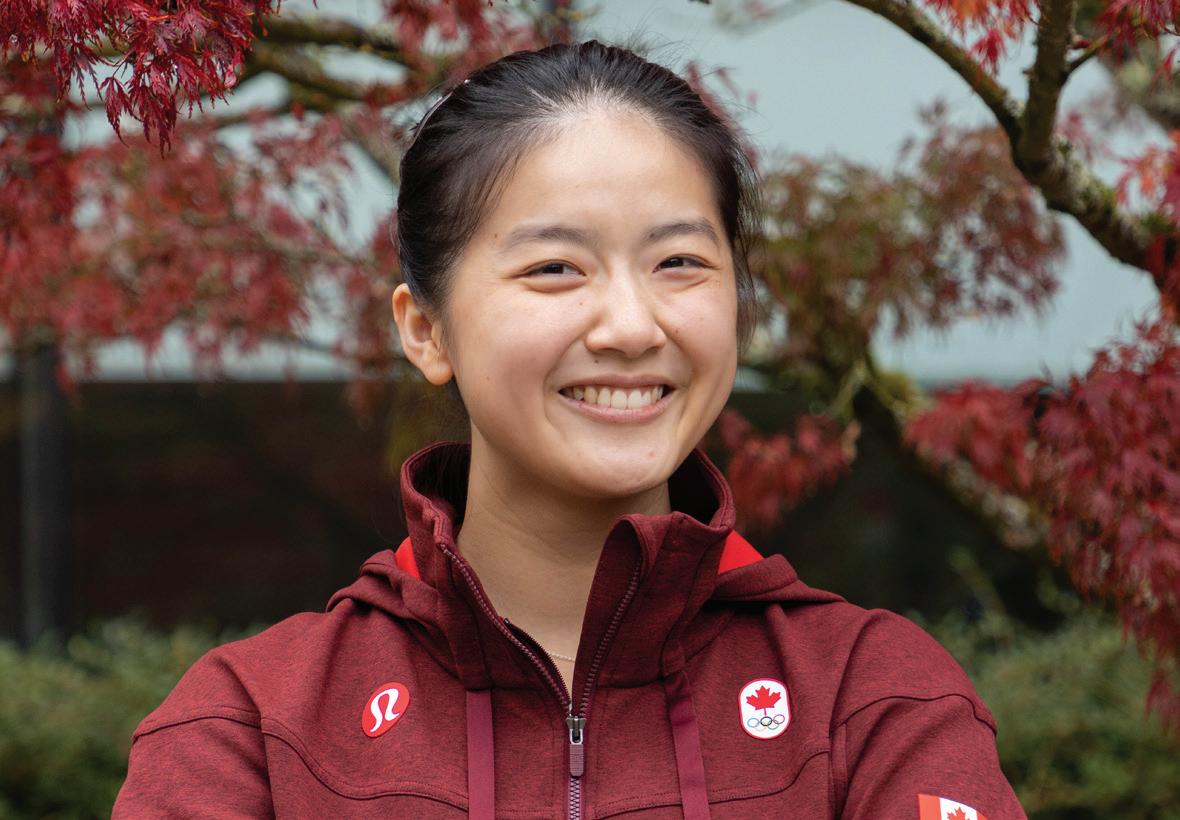
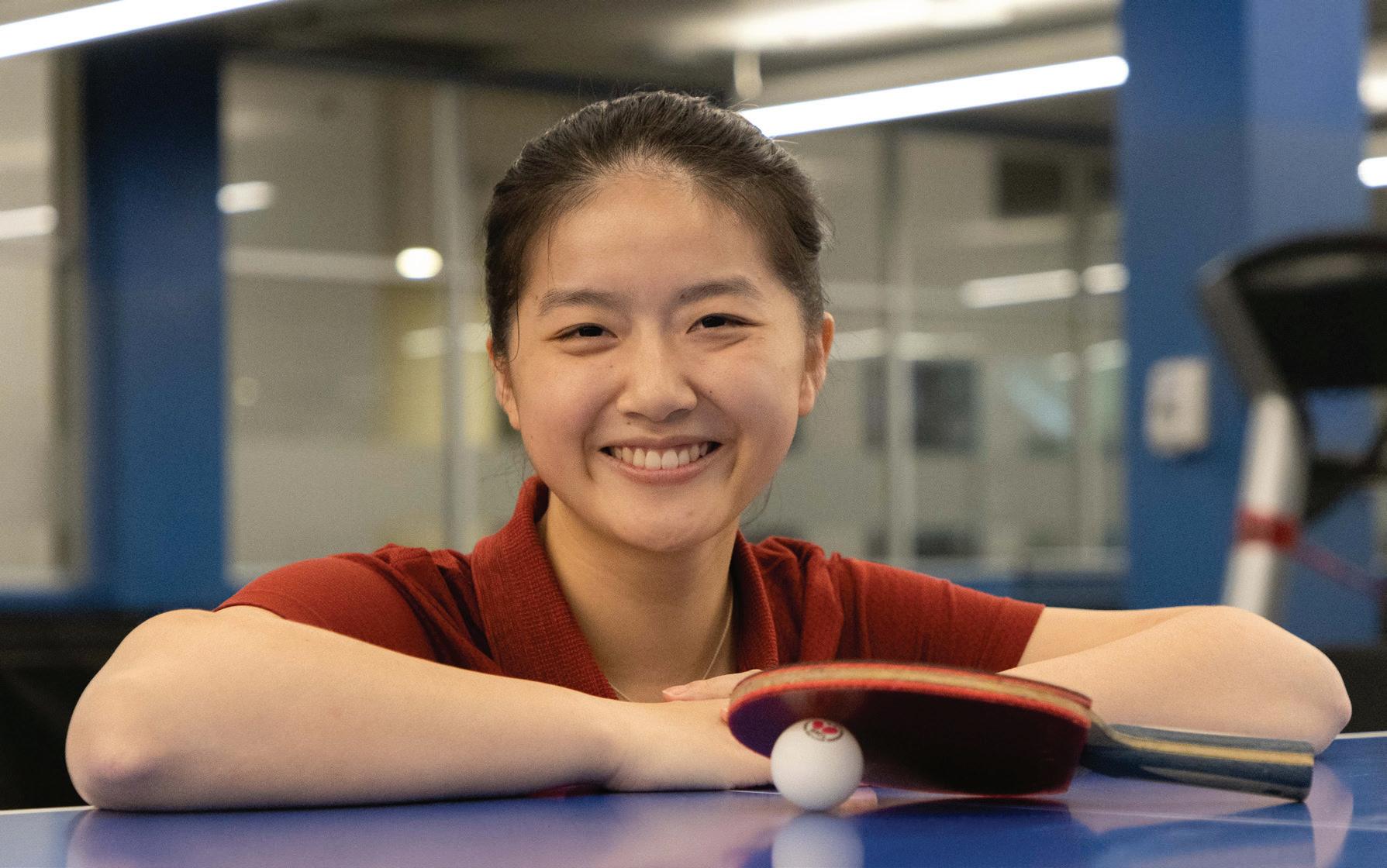
a place for 13 non-varsity sports — including table tennis — to compete at a high level under the T-Birds banner.
The club was relatively new when Liao joined, but it offered an opportunity for her and other table tennis players to practice and compete with like-minded student-athletes.
“I think the wonderful thing about the TSC program is that it’s not as much commitment as a varsity program, but it still provides opportunity for our athletes to stay engaged and involved with our sport, and take on leadership opportunities within the sport that help us develop not only … at the table, but also beyond that,” said Liao.
Supported by this new environment, Liao was inspired to take on a leadership role within the club by becoming the TSC’s external director.
Because TSC teams are student-led and mostly self-financed, Liao and the exec team couldn’t just focus on the sport, needing to spearhead efforts to grow opportunities and financial support for the club.
“It was a really cool opportunity to combine what I was studying in school in business, with the real world and an area that I was also very excited about and familiar with, table tennis,” said Liao.
The following year, she stepped into the club lead role, and took on even more responsibility. But with the impact the TSC had on herself and her peers, it was a responsibility she welcomed.
“I really enjoyed being able to support my teammates and my friends in having such an incredible opportunity to balance exercise and stay competitive alongside their studies,” she said. “Seeing my peers find community in the TSC … that’s been wonderful.”
During her time at UBC, the TSC wasn’t the only place she was able to grow. As she worked towards her undergraduate degree, she discovered an interest in the law, sparked by the intersections between business and law in her classes. This newfound passion inspired Liao to pursue law after graduation, starting in the JD program at UBC’s Allard School of Law in 2024.
“I grew up in … East Vancouver, [and because of that], it was very clear to me how big a difference having knowledge and a voice around policies, about the law … could make,” said Liao. “I think a combination of factors, including those, inspired me to pursue law.”
Because Liao had continued to play table tennis throughout her undergraduate studies, by the time Liao entered law school, she was used to balancing her studies and her sport.
Even with that experience, however, it was still a challenge. Going into Allard, for Liao, was another roadblock where, with the increased demands of a graduate degree, she thought she might have to cut back on her athletic career.
Yet, through a community that supported her at every turn, being flexible and adaptable to Liao’s schedule, she was allowed to continue to pursue both her dreams.
“The community at Allard and the legal community in Vancouver has just been so empowering and so supportive,” said Liao. “I’ve also noticed that table tennis is a really good distraction from law school and vice versa … that provided really good balance, which actually helped on both ends.”
It was right before she started law school that Liao had her sights set on the Olympics. Sadly, she fell a few matches short of qualifying. However, she doesn’t see this as a loss. If her athletic career has taught her anything, it’s to not define things by the final result.
For Liao, who has achieved so much in her long career as a table tennis player, this is just a small part of her journey, both in sport and who she is as a whole.
“My experience trying and failing at making it to the Olympics was invaluable in that I realized how much I had grown, and how much I got out of that opportunity to even try. I never thought that I would have the opportunity to actually go for it,” said Liao.
“It really made me respect the process of people who have goals or have grown a lot in their journey, even if it’s in a direction they never thought they would go in. I see a lot of beauty in that, and it also inspires
and motivates me to continue going down that journey for the different parts of my life, whether it is with table tennis or with law.”
Falling short of the 2024 Summer Olympics was not the end of Liao’s career. Most recently, Liao competed at the FISU World University Games in Germany, an international competition for student-athletes of different sports to represent their country and compete. While she was obviously there for table tennis, for Liao, these games were bigger than just one sport.
“The University Games … it was a wonderful experience … some of my fondest table tennis memories are [from] those games, being able to represent Canada — not just as a table tennis team, but as a [united] Team Canada,” said Liao. “From all the different countries, all of these students, all of these athletes, understood the grind of being a student-athlete.”
In a way, the University Games were a microcosm of what Liao has gained from her time in table tennis. It wasn’t the medals or awards. It wasn’t winning matches, tournaments or championships.
It was about the simple love for the game and for the community around it, whether it be with her brother during the COVID-19 lockdown, with fellow table tennis student-athletes in the TSC or with a host of other athletes, playing wildly different sports, but still coming together under one banner. For Liao, that community has given so much to her. Now, she’s hoping to return the favour.
“Opening doors for others the way that doors have been opened for me is something I’m very passionate about. Being able to have the honor of representing Canada, that’s kind of what it means to me — gratitude and wanting to give back,” said Liao.
“When I represent Canada internationally, I feel like it’s not just wearing the Maple Leaf and representing myself or my name on the international stage. I feel like standing behind me is my whole community, and with that, a country, and I want to make them proud.” U
“It’s crazy that it’s been over 15, 16 years now and I’m still playing the sport more than ever,” said Liao.
ZOE WAGNER / THE UBYSSEY
“It’s not all about winning or losing,” said Liao.
ZOE WAGNER / THE UBYSSEY
POWERS THAT BE:
Limiting new international students says something about the limits of Canada’s political imagination
The Liberal government’s immigration policy is about economics. That’s no surprise if you understand the genealogy of Canadian politics. But Latin America’s humanist politics offer an interesting comparison.
Politics encroaches on all aspects of our lives. Powers that be is a column written by External Politics Columnist Maya Tommasi about the ways in which political power — corporate, federal, provincial, Indigenous and municipal — affects the lives of those who call themselves part of the UBC community.
Maya Tommasi (she/her) is a third-year political science student and The Ubyssey’s politics columnist. She is a trans woman and latine immigrant, and holds a previous degree in psychology with multiple years of research experience. You can find her on Bluesky or reach her by email at m.tommasi@ubyssey.ca.
Maya Tommasi Politics Columnist
Politics is nearly always about economics. Look at the way the federal government talks about immigration and halving the number of planned new student permits next year.
However the policy is carried out, it seems that international students already in Canada will experience increased anxiety. If this move indicates a less restrictive immigration policy in the future, international students are left wondering if it will be harder to renew their permit if they decide to extend their degree by a year. What about a master’s? What about the countless students whose permits expire before their degree is expected to end? While this uncertainty will inevitably affect thousands, at no point does their suffering enter the conversation.
This is not exclusive to federal politics. Here at UBC, our
AMS seems not to have considered this either, despite international students accounting for over a quarter of the student body. In a recent statement addressing the cuts, they note how it will “[threaten] the financial stability of post-secondary institutions,” and “undermine the quality of education.” The closest they come to defending international students is granting that they “add to the diversity and richness of campus life” and “contribute to the local
his new book, America, América Grandin locates humanism — a philosophical tradition which emphasizes the intrinsic worth of respect for human dignity — as a key part of the political thought of Latin America. Humanism started in opposition to colonialism and in association with the School of Salamanca, a movement in the Catholic Church. Early on, humanists believed all people — including non-white, non-Christian and Indigenous peoples — had equal
“ ... colonialism happened differently in North America, and humanism never took off here in the same way as it did in our southern sister continent. The origin of North America’s dominant political values is more likely found in Protestantism, and in the liberal ideas of the American revolutionaries.”
economy.” They frame international students as tools to improve UBC, not living, breathing individuals whose experiences should be valued.
This is not exposing some sort of conspiracy. Politics is always framed through a specific lens. Nobody observes anything through a truly unbiased lens. The social and cultural context we live in inevitably shapes how we interpret politics. But we should recognize that the politics of today exist as consequences of history.
Recently, I watched an interview with historian Greg Grandin, where he discussed the developmental differences between Latin and North American politics. It’s the subject of
value and deserved equal care.
Humanism’s foundational nature in Latin American history is in no small part due to how long it’s been around. One of the most famous proponents of the movement, Bartolomé de Casas (a Dominican friar who chronicled and opposed the colonial violence against Indigenous peoples), was writing and advocating in the early 16th century. His book, Brevísima relación de la destrucción de las Indias (“A short account of the destruction of the Indies”), was published 50 years before the English set foot in Jamestown.
Grandin explains humanism’s pervasiveness as a consequence of a very different colonial history from that of North
America. The Spanish arrived not only before the English, but were much more aggressive. They brutally subjugated Indigenous people; in just a few years, they had taken most of Latin America, horrendously. Documenta tion of Spanish violence was widely available, and while the English (and eventually, British) conquest was no less brutal, it occurred much more gradually. Even a century into their colonial project, some Indigenous nations still had independence. This dilution of colonialism over centu ries made its impact less intrinsically shocking.
Because of the obvious brutality of the conquista and reports of violence in Latin America, opposition grew early on. But colonial ism happened differently in North America, and human ism never took off here in the same way as it did in our south ern sister continent. The origin of North America’s dominant political values is more likely found in Protestantism, and in the liberal ideas of the American revolution aries.
The effects of these different influences are perhaps best noted in a constitution. One of the pri mary differences between our Charter of Rights and Freedoms is the inclusion of “social rights” in similar documents from Latin America. Social rights often

ing of the government’s role. I grew up in Brazil. In the Brazilian constitution, you will find “individual and collective rights and duties” and “political rights” mentioned in chapters 1 and 4, respectively, which approximately represent the same rights protected in the Canadian Charter. However, in chapter 2, you will find social rights: protections for housing, healthcare, education, leisure and social security; but also a minimum wage, 40-hour work week, paid
free-market values — you will find similar protections for education and social security. In the same way humanism transcends the left-right spectrum in Latin American politics, liberalism does so in Canadian politics. Take housing, for example. No matter what party you’re talking about in Canada, the solutions to the housing crisis are market-oriented ones. We talk about regulating the market through an empty homes tax or increasing supply (build
tious issue is that of land reform and appropriations. In that political ecosystem, there are organizations that occupy empty housing and build encampments for people who live in poverty, and the current government supports them. Land in Brazil legally has to serve a social function; abandoned properties can’t. The well-being of people is prioritized over traditional property rights. That’s unheard of in North
While groups will draw different lines around humanism, you will be hard-pressed to find a group that rejects it outright.
“In the same way humanism transcends the leftright spectrum in Latin American politics, liberalism does so in Canadian politics.”
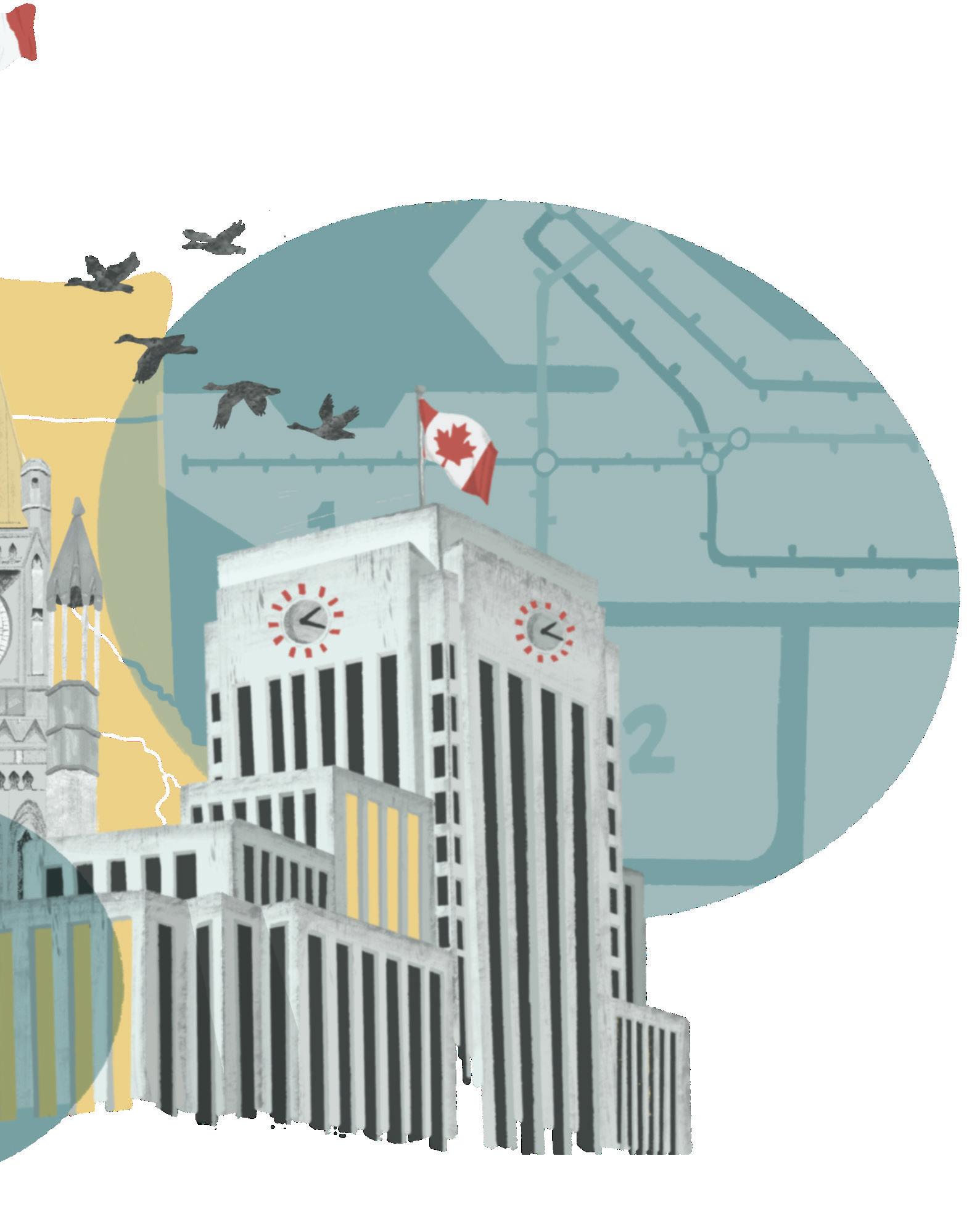
Humanism exists in conjunction with liberalism — one does not overtake the other. An argument for humanism isn’t an argument against liberalism. I’ve written before about how I actually believe liberalism is a good foundation for a democratic system and is not (at least for the most part) in conflict with humanism. What I am trying to show, though, is that political heritage has recognizable effects on politics anywhere. Compared to Latin America, colonial conquest plays a more active role in the national histories of both the United States and Canada — with manifest destiny and western expansion in America and a less antagonistic break from empire to federation in Canada. This doesn’t mean Latin American nations didn’t participate in colonialization, or are absolved of responsibility for their participation. They aren’t. But their national identities are based less on the original colonial project and more on emancipation. Brazil’s founding myth focuses on the union of three peoples: Indigenous, Black and white. The story goes that by being a union of three distinct but equal peoples, Brazil developed a racial democracy where, unlike other nations, it overcame racism. It’s a pure fabrication. Brazil continues to have deep race-based inequality to this day. It was built on chattel slavery and colonial atrocity.
But this myth still perpetuates a view of Brazilian citizenship that is less about individual heritage than it is about participation in a society.
Canadian multiculturalism, by contrast, focuses on a group identity. In that frame, immigration policy (i.e. international student cuts) affects diversity — but the citizenry is already diverse, so restrictions on immigration don’t end multiculturalism, conceptually. Immigration policy, despite disproportionately affecting non-white people, is not really about multiculturalism, then, and criticism of it isn’t about the human experience of individuals — like what the AMS said in its statement.
It’s natural that we prioritize the economy. Housing too, as an especially important part of our economy. That wouldn’t change through a humanist framing. But could we not envision a politics that also takes into consideration the humanity and well-being of everyone, not only citizens?
I think we can engage in politics more creatively. We can recognize, criticize and even shed a lot of our ideological baggage. We should, as a society, hope for advancement. And despite the grand scale of those ideas, they are still possible. Even in the case of Latin American humanism, its influence is not absolute — far from it. It’s not the solution for all our problems. But I genuinely believe in centring the individual human experience, and that their well-being should come before group identification or national projects.
There is a lot I do not miss about Latin American politics, and a lot I admire and appreciate about our Canadian counterpart. However, I wish we would concern ourselves a bit more with collective responsibility to humans, as humans, regardless of their origin. The conversation about immigration severely lacks it. U
This is an opinion essay, and a part of a regular column. It reflects the columnist’s views and does not reflect the views of The Ubyssey as a whole. Contribute to the conversation by visiting ubyssey.ca/pages/ submit-an-opinion.
VOTING IS OPEN for faculty and staff positions on the Board of Governors
The Board of Governors is responsible for the property, revenue and business of UBC under the University Act. It’s composed of 21 members — the chancellor, the president, 11 provincial appointees and 8 people elected from students, faculty and staff from both campuses.
Two UBC Vancouver faculty positions and one UBC
Vancouver staff position are up for election, and we reached out to all 18 candidates across both races to understand why they’re running.
Read our profiles on each candidate below. Polls are open from November 13 to 27. If you’re a staff or faculty member, visit ubc.simplyvoting.com to cast your ballot.
Here are candidates’ answers to the question “Why are you running and why should people elect you?” For each candidate’s full Q&A, visit ubyssey.ca.
FACULTY CANDIDATES:

LEONARD FOSTER
Professor in the department of biochemistry and molecular biology
“I’ve had several different administrative roles at UBC, in different departments and faculties, and for the VP research and innovation portfolio. I’ve always quite enjoyed many aspects of it, particularly the opportunity that those kinds of roles give you to see the bigger picture at UBC. I do get quite a lot of satisfaction out of helping make people’s lives better. In some of the supporting admin roles that I’ve had, the most rewarding aspects have been seeing the fruits of my labour: when you do something and then you can actually see, in pseudo-real-time, how it might benefit the broader community. So why should people elect me? I guess I bring a perspective on research and the importance of research to the broader UBC community, but particularly the importance that research holds for most faculty on campus. I feel like the Board of Governors have got a very broad mandate, but research, supporting research and making decisions that specifically benefit research broadly across the campus has not really come out a lot in Board activities. So I’d like to bring that perspective to the board.”
ERICA FRANK
Professor in the School of Population and Public Health
“I’m running because I mind the gap. I’ve been involved with volunteering at UBC, both on academic committees, but also in the University Neighbourhoods Association, since I came here in 2006. It’s clear we have an extraordinary university, but there are places where gaps exist because I believe the university isn’t always doing an optimal job at listening to all of its constituents. I’d like to be a voice for faculty and for others, but particularly for faculty constituents, because I think that these missed opportunities are a barrier for us to go on to become the truly extraordinary university that we could become. Most of those issues are concerns about community, and that’s an area that I have a lot of experience in, both organizationally as a founder and principal investigator, but also as someone who’s lived in co-housing, who has been appointed by Campus and Community Planning as the developer of co-housing at UBC. These are the kinds of social determinants of health, well-being and thriving that I think I can bring.”


ADAM HOFRI-WINOGRADOW
Professor in the Peter A. Allard School of Law
“I am a professor at the Allard School of Law, specializing in the law of trusts. This branch of the law is focused on managing the property of others for those others’ benefit. Such management is a lot of what the Board of Governors does: the board is tasked with the management, administration and control of the property, revenue, business and affairs of the university. I believe my expertise in trust law and familiarity with financial reports and accounts would make me useful on the board. The other reason I’m running has to do with another role I’ve been filling — and I still fill — at the university. I am currently on the Executive Council of the Faculty Association, and in that capacity, I have come to realize the relationship between faculty and administration, how complex it is and how many things can go wrong. It’s very complicated. The Board of Governors is not actually a majority faculty body. Most members of the board are civic appointees. They’re appointed by the province. Of course, I’m 100 per cent on board with that. Given the public nature of our university, the government, the province and the public outside campus should have a voice in how massive resources are being deployed. But given how precarious faculty careers sometimes are and how not every decision the administration makes is necessarily in faculty’s interests, it’s important that faculty have a strong voice on the Board of Governors. It would be an honour for me.”
MARK MAC LEAN Professor in the department of mathematics
“I was on the board in 2020 to 2023, which was during COVID-19. I’ve been at UBC a long time. I came as a graduate student and then stayed as a faculty member. I have a deep love of this place and interest in seeing it grow in the right ways, in achieving its aspirations for itself as an institution. In my time, we’ve gone from being very provincially-focused, to nationally-focused, to internationally-focused. I think I’d like to continue to contribute to the governance of the university. We are in a time, I think, of major transition for UBC. We’ve come out of a fairly extended period of probably a dozen or so years of quite substantial, rapid growth, very strong financial growth and so forth. Today we are in a more plateaued period, if I’m optimistic, and where world events are hitting us in many different ways. And as we transition as a university, I think I bring depth and breadth of experience to that conversation, and having served on the board previously, I have at least the knowledge of how the board functions to hit the ground running.”

CHARLES MENZIES

Professor in the department of anthropology
“I firmly believe that we should be active participants in holding our communities to account, be that work, life, community. When my kids were in school, I was involved with parent advisory councils. I’ve sat on the University Neighbourhoods Association Board of Directors. I’ve been a member of the Faculty Association Executive Committee. I’ve served in other governance positions, but I’m a bit different than the typical faculty member who runs for election for governor. Very often, many of the folks who do so have been in administration on one level or another. Department heads, deans, associate deans, vice-president — these kind of positions. I actually come from a kind of basic grassroots perspective, and have been there for quite some time and I’m quite happy with that role. I think if we do believe in the diversity of perspective, we need to ensure that we don’t have a mirror of people looking all alike and acting all alike on our governing bodies. We need to hear different voices, and that’s part of what I bring to the picture — plus a commitment to openness and democracy.”
STEVEN MILLER Professor in the department of pediatrics
“I am a physician-scientist and educator in the department of pediatrics in the faculty of medicine. I started my career in Canada at UBC in 2005, and I’ve had the opportunity since then to work at UBC and another Canadian institution, coming back to UBC in 2022 to lead the department of pediatrics. I think we have an outstanding university, and I am impressed by the community of people who make up this university — faculty, staff, learners — and I am interested in joining the Board of Governors to promote an even more outstanding university. I’m particularly interested in representing the faculty voice with the goal of strengthening our university in accomplishing its mission: research, education and promoting a better British Columbia.”
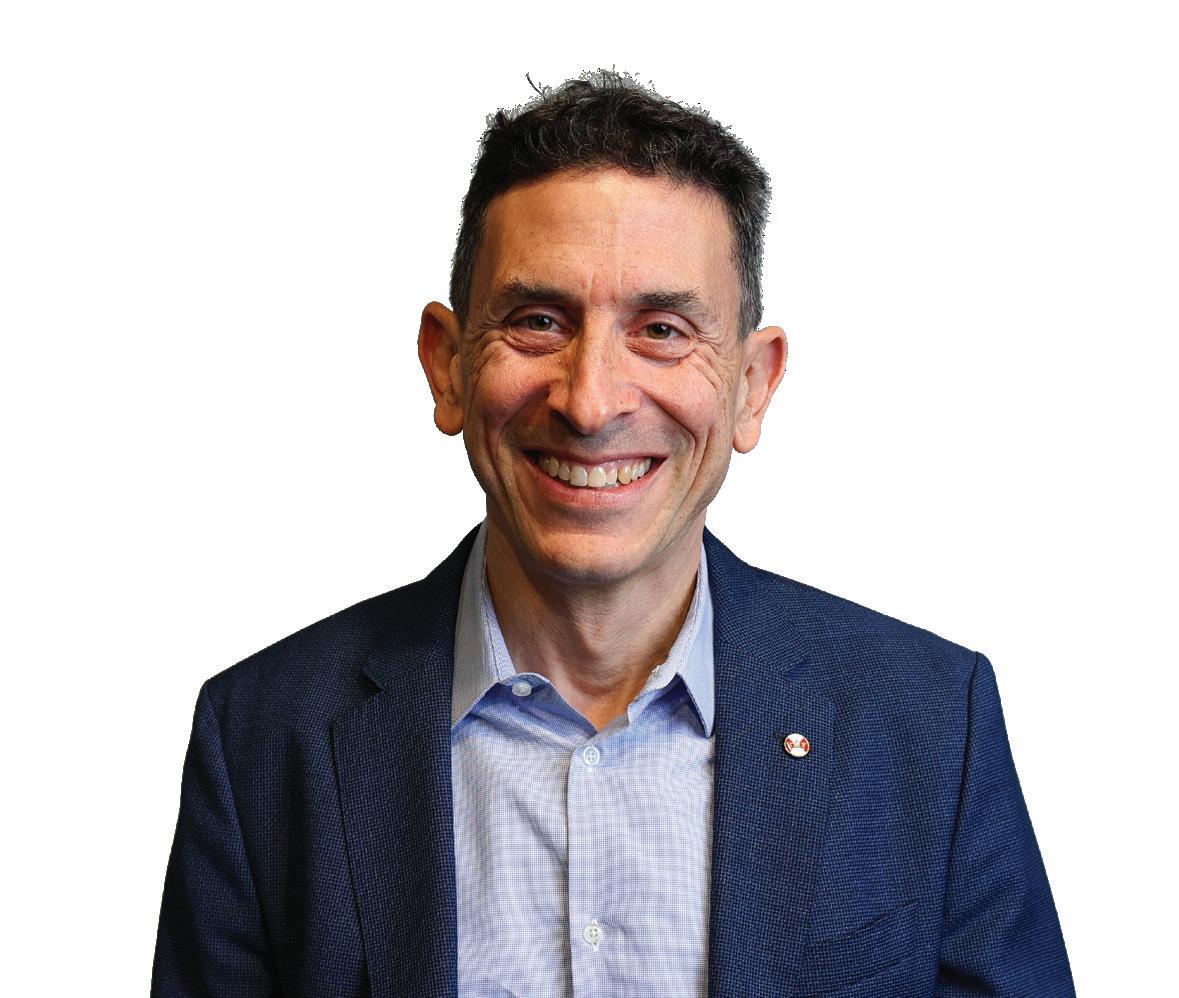
STAFF CANDIDATES:
*Candidate Damara Klaassen, Executive Director, International Student Initiative, did not respond to our interview invitation.
SOPHIA REDMOND Associate Director, Strategy and Decision Support
“The first fundamental belief is that I really believe the staff keeps this university running and thriving. I’ve been with UBC for 10 years. I’ve witnessed the creativity, dedication and talent that staff bring to the community, alongside faculty, students and the broader community members. I truly believe the decisions are stronger when staff’s perspectives are heard and truly valued throughout the decision-making process. I wanted to make sure that I have the opportunity to use my experience as an economist, strategist and experienced board member to bring forward staff voices to the Board of Governors and shape that decision in a very meaningful way. The reason I’m running now is that I think UBC is at a very critical time, as we’re navigating economic uncertainty and shifting government priorities. I think, as a very experienced economist — I’ve been in economics for about 10 years, before joining UBC — I can contribute to guiding UBC through that change and come out stronger. Also, this is the time we really need to make some real choices. Some strategic ones, and sometimes tough ones. As a strategist at UBC, I helped organizational teams navigate that trade-off conversation with clarity and keeping people in our shared vision at the centre of every decision. More than ever, the staff need a strong, credible, collective and collaborative voice at the table, one that can truly ensure the outcome. I am board-proven. I have eight years of work experience across four boards, including being appointed by the province to the Passenger Transportation Board. I’m confident that I can bring feedback, a voice for the staff and follow the broader community. Lastly, UBC is such a special place. My two kids go to UBC daycare. I spent a lot of time with my family on the UBC campus on the weekend. Friends and family come to study at UBC. Truly, this is a place that continues to inspire ideas and actions for a brighter future. I believe in our shared vision and our collective efforts, especially if we pull it in the same direction. That’s why I’m running for the Board of Governors at this time and for this special place. I will be honoured if the communities see me as that voice that can bring forward the staff’s perspective to the Board of Governors.”
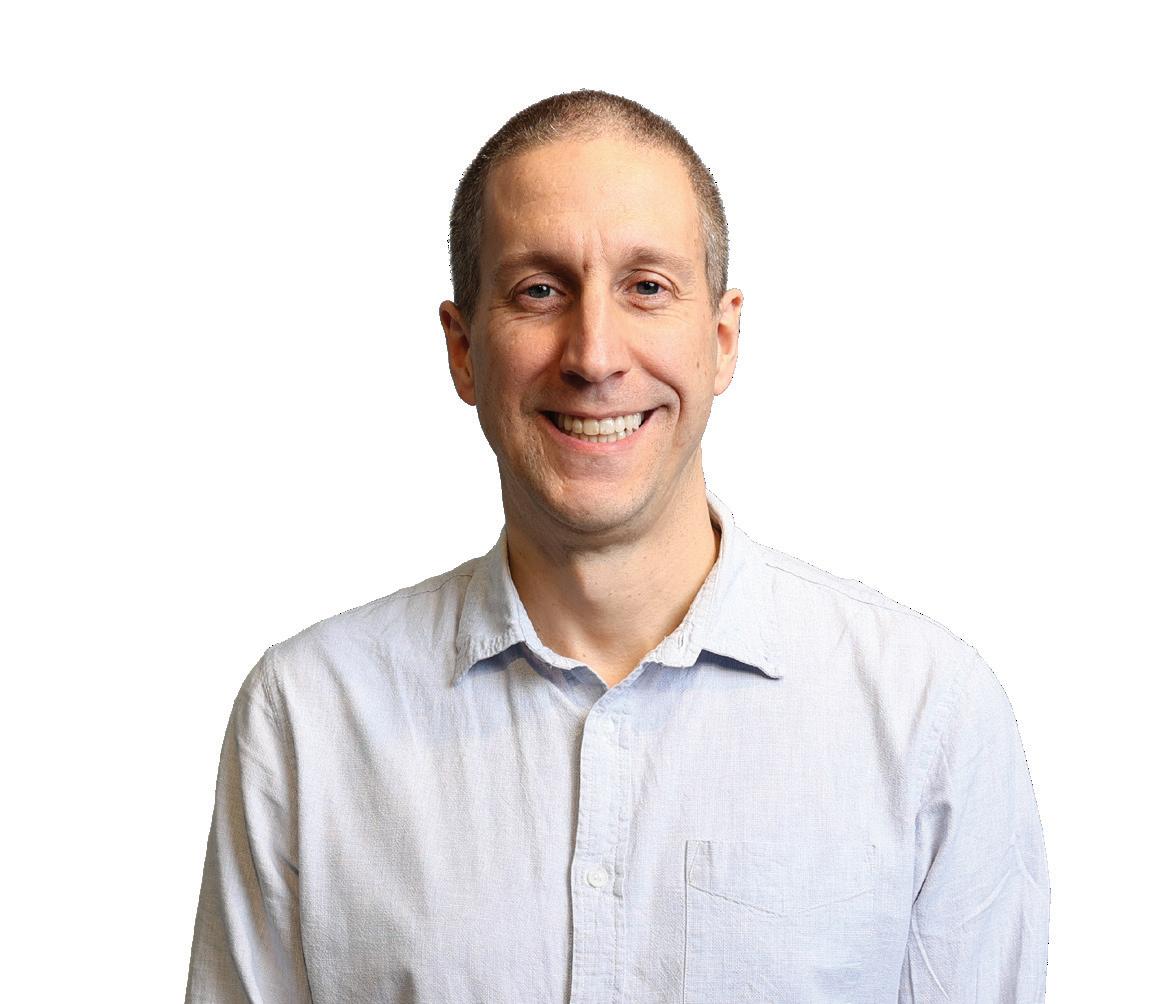
ALEX BUSH

Manager, Student Services in Civil Engineering
“I would like to volunteer for the board, particularly because I’d like to be a staff representative for student interests. As a manager of student services in the civil engineering department, it’s really important to me that students get a positive experience. UBC is a student institution first. What motivated me to run was that a couple of years ago, one of our students transferred between two related master’s programs, and after he had transferred, all of the tuition he’d paid towards the first program was erased, and he had to start again from scratch. It felt unfair to me that he couldn’t count that money towards the new program. These were very related programs. It’s not like he was moving from, say, engineering to history. The transfer was within our department and within our program. I looked into what are called legacy tuition rules, and they’re written by the Board of Governors. I thought I could join and maybe advocate for tuition reform for some of our students.”
NATHAN HERRINGTON
International Student Recruiter and Advisor
“I’ve been a member of the UBC community for about 10 years now, as both a student and a staff member, and it’s been a pivotal part of my life. I came to UBC with the idea, with the vision that this was an institution that aligned with my values. I came to UBC at a time when climate was one of the main promotional factors in UBC’s recruitment: ‘Come here if you care about the environment.’ And I did. I do. It was international. I was Canadian, but had been living in the Arab world my whole life, and I knew I would find a diverse network community that would reflect the diversity of the world, or at least I hoped I would. In the decade that I’ve spent at UBC, I think I’ve started to question things a little bit more. I studied human geography and the relationships between people and place. I learned about how caring about the environment isn’t just about the environment, but also about people and the concept of climate justice. I learned how to deliver a land acknowledgment when I was delivering campus tours to prospective students, making them feel welcome in our community and helping them understand how it felt for me to be an uninvited guest on land that has experienced dispossession, genocide and apartheid. I’m running for the Board of Governors because I want to live in a world where the most international university in North America, without question, would take any and all necessary action to remove its complicity in the destruction of every university in Gaza. Staff pension funds and the university’s endowment have holdings in weapons manufacturing companies that enable the same colonial violence that took place here elsewhere. And we’re told that this investment is aligned with neutrality, as if it were taking a stand to divest. I reject that claim. I think that any university with an Indigenous Strategic Plan cannot be neutral when it comes to genocide and occupation. I am running for the Board of Governors because I envision a university with integrity, and I want people to vote for me because I’m committed to asking the hard questions and doing the right thing, even when it’s the hard thing..”
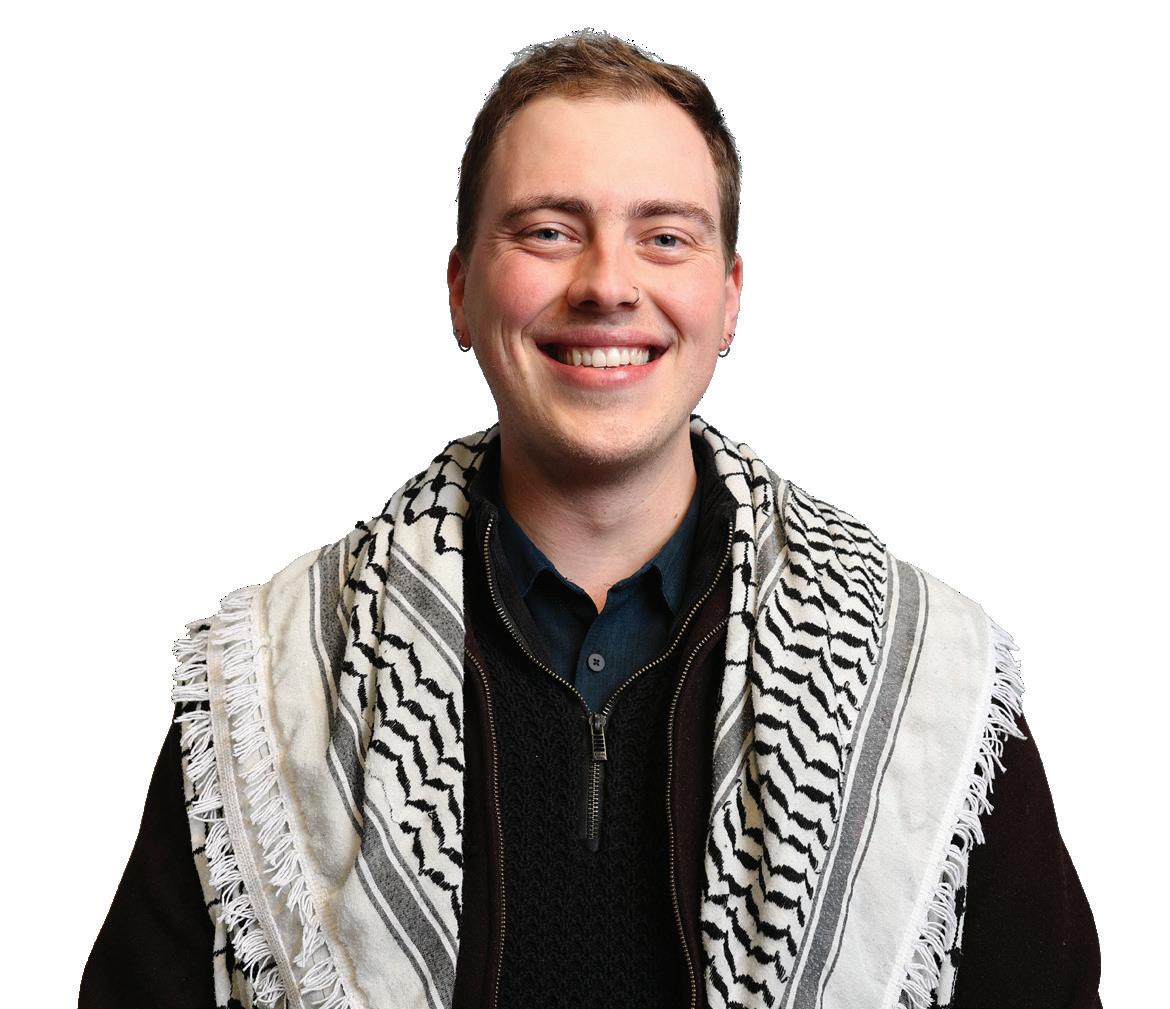

JOHN EDE Contract Manager
“It’s a marriage of duty, experience and opportunity. UBC has been home to me and my family since 2017. I worked here for eight years now, and my sense of duty comes from being responsible to contribute to the society that feeds you. I think that everyone has a sense of duty to contribute to the society that sustains them and their families. I also have a very wide field of experience, from business, politics, technical experience, business management and people management. I think that, for the past 20 years, I’ve amassed quite a chest of skills that will be very helpful to a body like the Board of Governors. I’m running to bring my wealth of experience to bear on a sense of duty. The opportunity part is, I’m a growing professional. I made a switch from business management and engineering to public service when I chose to do a master’s in public policy and global affairs here at UBC.
I see this opportunity as a chance to grow my profile in public management and public service. It’s a marriage of three objectives for me. I think people should vote for me because I bring a unique perspective as a former international student, an international business person, someone who has worked and served as a student leader, a staff leader in the Association of Administrative and Professional Staff of UBC and even run for public office in Vancouver-Quadra in the last federal election. All those things put together, I think that I bring a unique set of skills that would help and support the board in meeting its objectives.”
KINWA BLUESKY
Senior Manager, Indigenous Initiatives
“I think I’m in a unique position. I have been an undergraduate and graduate student. I work as a sessional instructor. I’ve been a residence advisor. I used to work in what was called Career Services. I think I’ve spent almost a decade in administration or operations at the university as staff, and now I’m a PhD student here again, but I’ve been a student for longer, almost 13 years. I think I bring a unique lens to this work.”
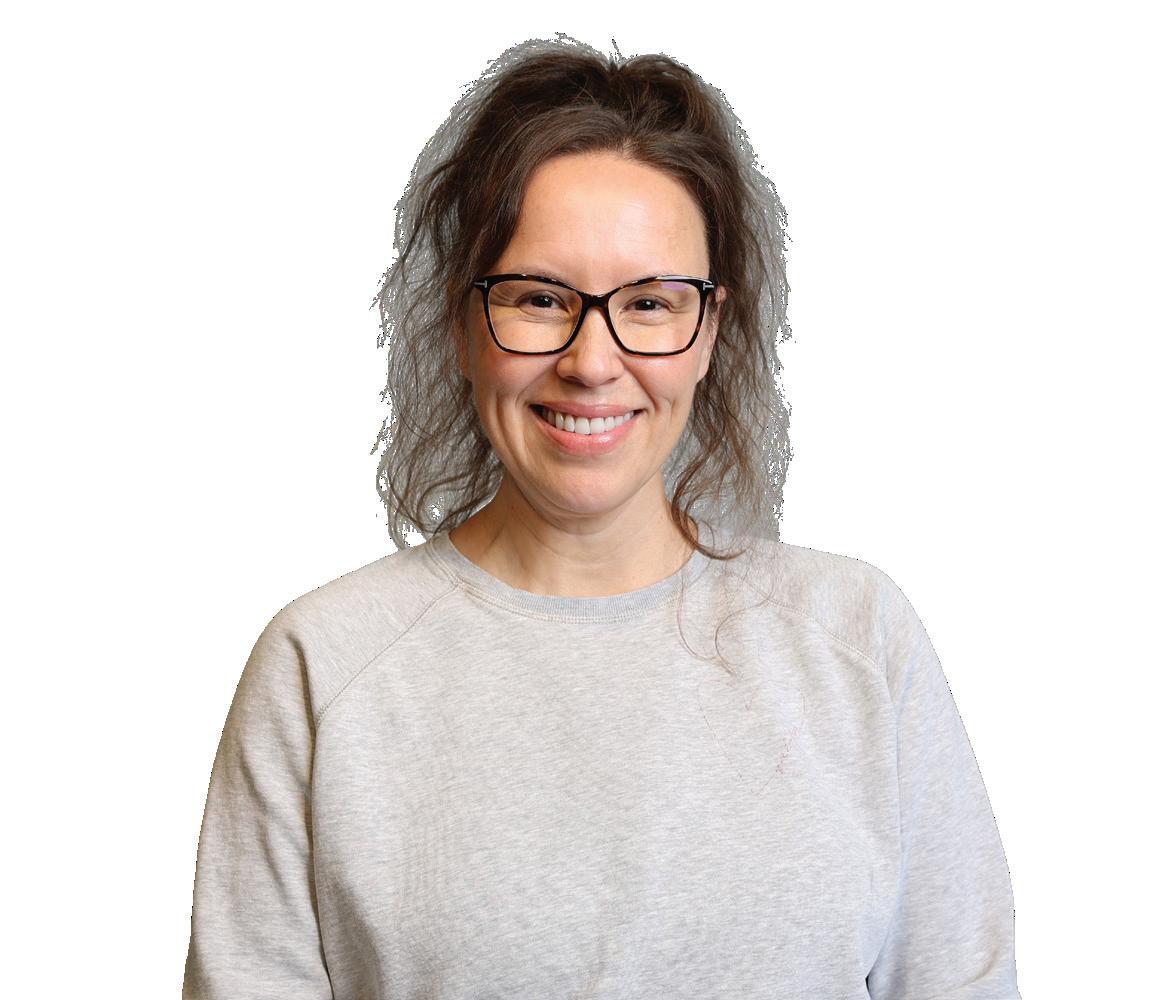
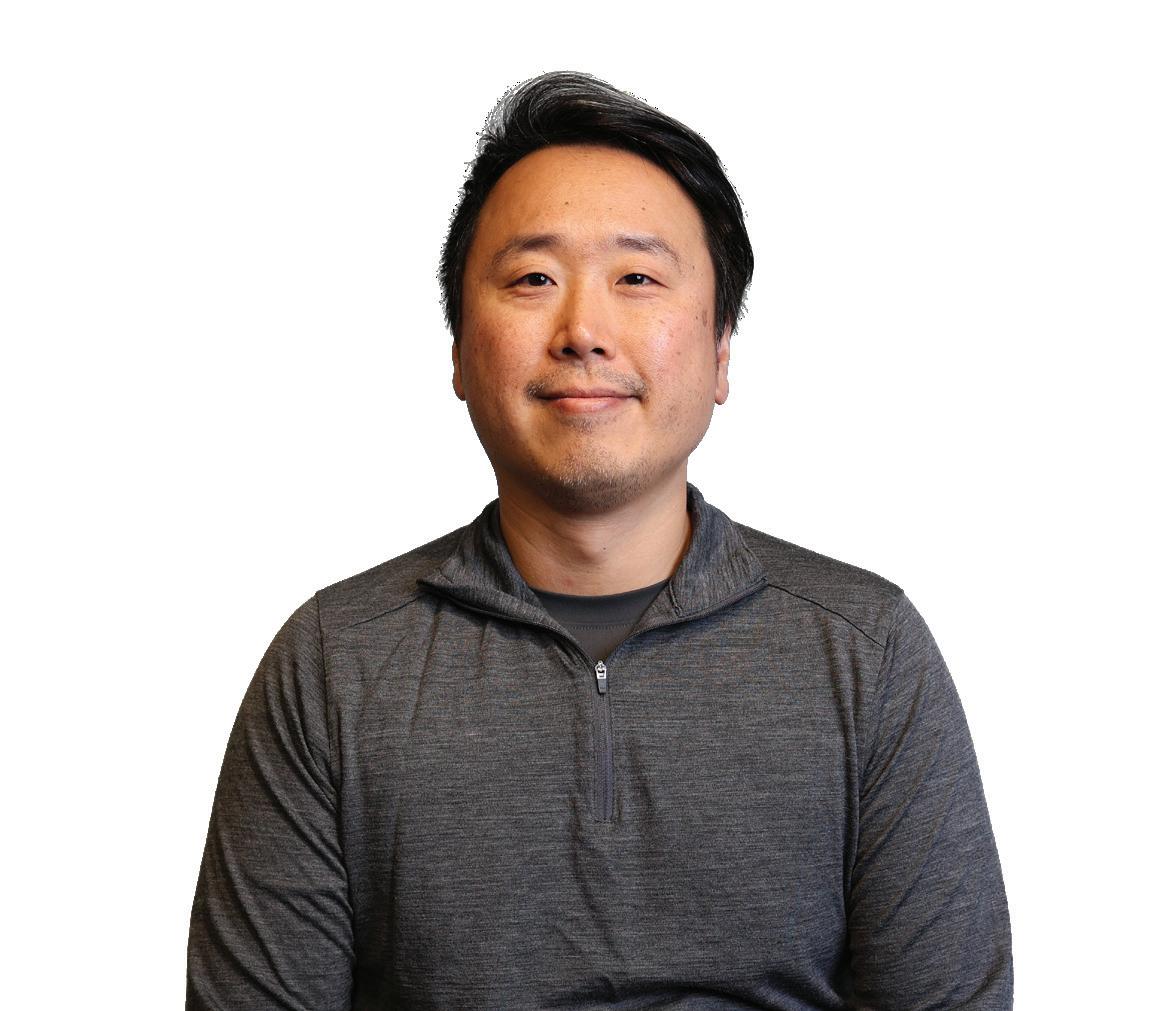
PAUL KWON Manager, Finance and Operations
“I live in Burnaby, and I enjoy watching the City Council meetings. We had a basketball hoop built in a park right near our home, and it was cool watching the city plan and discuss with parks and all the other groups, and engaging parents. It was really cool to see it all come together. The Board of Governors is the government of UBC, and I want to be part of that governance group. There’s a ton of smart, amazing people on the Board of Governors and running in this election. I want to bring a staff perspective from my level that’s sometimes missed at these Board of Governors meetings to make sure our views and stories are represented.”
DARLA LA PIERRE Manager,
Business Operations, Department of Electrical and Computer Engineering
“I’ve worked at UBC for 25 years now. I was a student, I graduated in 1998 in the faculty of arts with a history degree, and I’ve been a community member for my entire life. I am quite concerned about UBC right now, with the dependence on international student tuition and the effect that the decrease in international students has on the departments, the academic mission and the research mission. We need to build a more resilient UBC. The government recently announced even greater cuts to student visas, and we really need to be agile to manage that, to keep the quality of education, and continue to create value for students.”


MIKE NICHOLS Client Services Manager
“Right now, there is a lot of opportunity for UBC to be a leader in how it reflects its values to the world. We went through COVID and a significant change in the workforce, and now we’re starting to see the potential impacts of AI on the workforce at UBC as well. There’s a real opportunity for staff to have a voice at the table on how the Board of Governors makes decisions. I bring to the table a perspective from the middle ground. Most of my roles at UBC have been facilitating between a functional unit like IT, or projects like the Integrated Renewal Program, and research groups or other administrative or functional groups. This gives me the opportunity to play that middle ground in supporting not only the initiatives of the university, but also the interests of research and administration.”
AARON CUNNINGHAM
Associate Director, Student Support & Advising
“I really want to contribute to the university and I want to be able to provide as much of my service and commitment to an employer that I really appreciate being a part of. I think UBC is a fantastic place. It offers so much community here. I want to see it improve. It’s already a reputable institution, but I want to see it even more reputable in the future. I really do think the people that make up the university — staff, students, faculty, researchers, folks that just call the campus home, all of these people make the university what it is and contribute a great deal to its success. I want to be able to serve those people. As a staff representative, I’d be serving in a great way.”
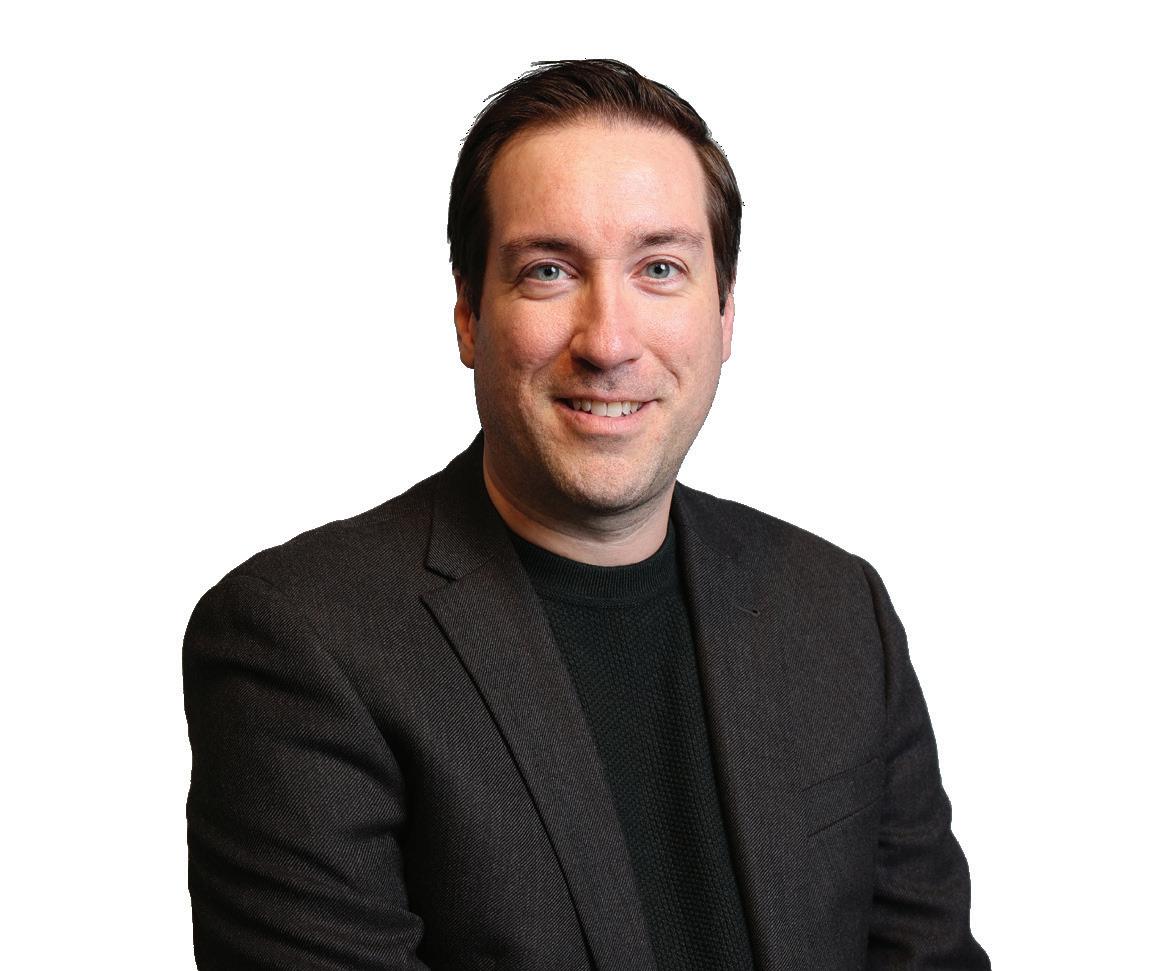
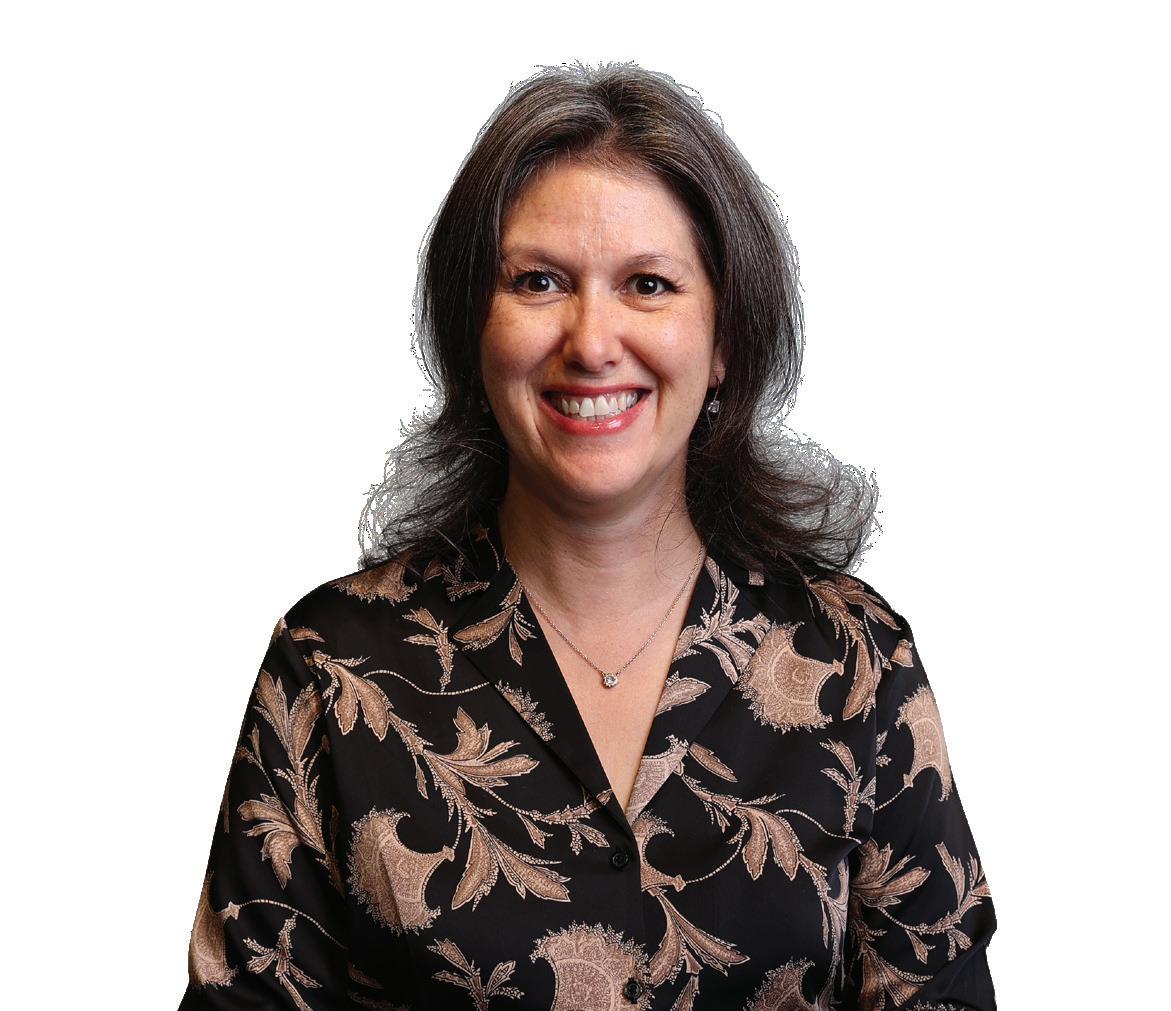
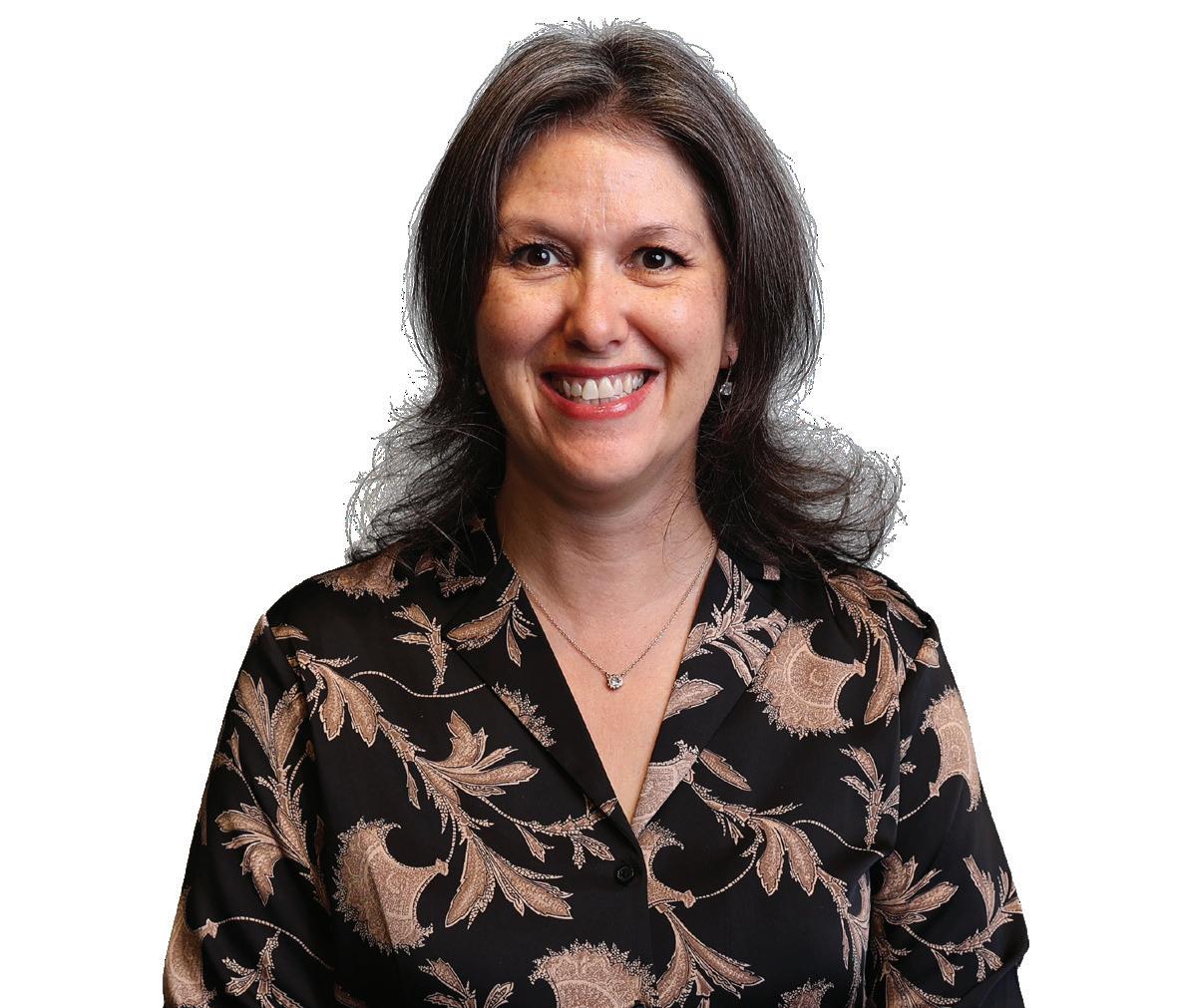
JODY SWIFT
Executive
Director,
Strategy and Planning
“I am running for the Board of Governors because I believe strongly in service as a form of leadership. I think that the best way we can learn about an organization is to serve the organization in different ways. I’ve been an undergraduate student, a graduate student and a postdoc. I’ve worked as a staff member in a department. I’m now working in a faculty, and I’d love to serve to learn more about how the board works to support the university.”
MATT TAN Associate Director, Partnerships
“First and foremost, I really care about everyone at UBC: students, community and faculty. Having worked for UBC for 18 years, it’s been about ‘how do you make UBC better? How do you help UBC in a way that is beyond your day to day?’ Serving on the board has been the absolute honour of my life. To be elected by my peers three years ago and to serve is just something that I believe we should do. I think we should give back. I think we should serve. I think we should try to make a difference. That’s why I’m running again. To continue to work and try to make UBC better. I’ve learned a lot in this first term, and I want to keep building, keep going, finish off what I can, make a difference and make UBC better for everyone.”

How social mobility relates

Majd Contributor
In response to the rise of the farright in places like Europe, some researchers seek to understand what fuels people to vote for these parties, what tactics these parties use to get people to vote for them and who’s especially vulnerable.
A recent Comparative Political Studies article by Dr. Alan Jacobs, UBC professor and head of the political science department, and Dr. Mark Kayser, professor of applied quantitative methods and comparative politics at the Hertie School in Berlin, investigates one under-explored driver of farright voting: social mobility.
In an interview with The Ubyssey , Jacobs traced the idea for this paper to nearly a decade ago. “The far-right in Europe and the U.S. was very much on the rise, but still not at the levels of electoral success that they’ve reached today.” Jacobs and Kayser were struck by the way these parties were “appealing to a sense of nostalgia, of looking back to times when things were ‘better’ than they are today, and promising to restore those … imagined better conditions.”
Part of that nostalgia, he said, seemed to be about the restoration of “ethnic and racial homogeneity, a time before mass immigration,” but another major piece of it was “harkening back to better economic times.” This was the piece they decided to investigate.
While there was already a vast literature on drivers of far-right support, much of it focused on current economic circumstances, like factors of income or employment status. What hadn’t been attended to, Jacobs noted, was the “long-term [socioeconomic] trajectories that people experience throughout their lives” and how they shape susceptibility to far-right appeals.
The authors therefore foreground social mobility — a
person’s movement between social classes — as the theoretical hinge.
“[Social mobility] seemed to us like a hunch worth pursuing — that people who have slid down the social ladder compared to their parents [would have] a very profound sense … of the current economic system not having worked out for [them],” said Jacobs.
To examine that link empirically, the authors used data from the European Social Survey (ESS) across 11 European countries from 2002–2020. They looked first at political affinity, examining ESS answers to who respondents voted for in the most recent election and then which party they felt closest to. Jacobs and Kayser then examined respondents’ current occupational status and their parent’s occupational status (from when the respondent was a child) for people who had voted for parties coded as far-right. These were defined as parties that combined anti-establishment rhetoric, frustration with the political elite and campaign messages that prioritize the interests of the native-born population, while portraying minorities as threats to national prosperity.
The study’s population was limited to those who were “native-born members of the country’s majority ethnic group” because status loss-focused arguments are meant to be applied to once-dominant groups and because immigrants and ethnic minorities are less likely to be drawn to explicitly nativist appeals.
With this data, the researchers could look at the specific effect of change in socioeconomic status on the likelihood of a person voting far-right. The results were as expected, with downward mobility correlating positively with far-right voting. Dropping one “occupational status category” below one’s parents increased the chance of voting
search has for Canada. While he couldn’t give precise claims without specific data, he acknowledged that the changes we’re seeing in the labour market’s occupational structure in Europe and the U.S. apply to Canada as well. If intergenerational downward mobility is becoming more common globally, it is reasonable to think some of the same political effects could be happening here (even if empirical evidence is still sparse).
That said, Jacobs emphasized a key difference: “until very recently, the far-right [in Canada] has been almost a ‘non-phenomenon.’” This may be starting to change, he said, with Pierre Poilievre’s leadership of the Conservative Party and others like Danielle Smith in the United Conservative Party of Alberta. Rather than Canada seeing the rise of a distinct far-right party, the country’s mainstream Conservative party has merely shifted right.
far-right by 16 per cent. Dropping three categories increased the chance by 60 per cent. However, upward mobility didn’t decrease the likelihood or have any “discernible effect.”
The Ubyssey asked Jacobs what implications this re -
ADVERTISEMENT
He also isn’t sure whether there would be much electoral support for hard-right positions in areas such as immigration and xenophobia, since culture-based anti-immigration appeals are less likely to be seen here. Hard economic times, however, could give way to a push for the far-right, as financial justifications for limiting immigration may become
more relevant.
When asked about solutions, Jacobs pointed briefly to obvious (but very hard to implement) economic policies that would “create more high-skilled, high-paying jobs that allow citizens to move up the occupational ladder or at least hold constant.”
More important than the reduction of status loss itself, he said we need to look at broader social policies that reduce the perception and feeling of such loss.
“What are things governments can do to help citizens feel more socially connected, feel more invested in the social collective and feel more invested in their communities?”
Moreover, these policies should help citizens to feel more trusting of the institutions that govern them and to feel that they have a voice in those systems.
“I think a lot of what downward mobility does is it eats away at that trust … [that] the system is working for you,” Jacobs said.
“I don’t know that steering the economy is going to necessarily be the best solution … But there may be other steps in the causal chain where companies can intervene so that the kind of job you have doesn’t define your sense of social status, your self esteem, your sense of whether you are valued by society and have a voice.” U

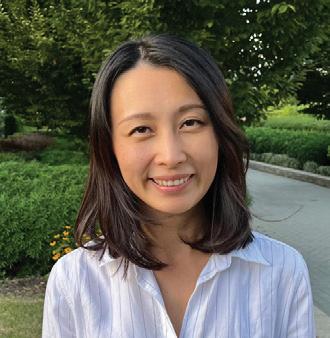
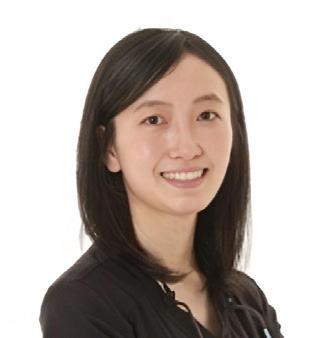

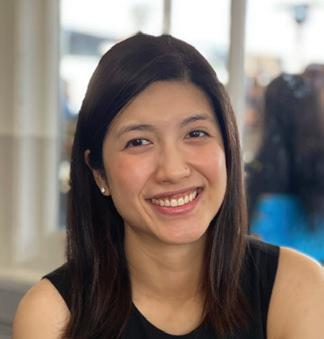



Saba
The authors foreground social mobility, or a person’s movement between social classes, as the theoretical hinge.
AYLA CILLIERS / THE UBYSSEY




